Helen Walsh's Blog, page 3
April 26, 2023
Letterbox: Bookish & Filmish
I’ve returned from a fascinating week in London in which I stayed in Shepherds Bush, a dynamic area west of Kensington I’d never really visited except to go to meetings at the BBC.
My hotel was oddly fascinating. My room triggered an unfortunate muscle memory of Super 8 Motels from US road trips; the breakfast area was filled with publishing types and in the evenings hordes of men speaking Russian, often sporting loud gold jewellery, occupied the main floor lounge and bar.
It was a delegate hotel for the London Book Fair, which I attended and which turned out to be a masterclass in the world of books.
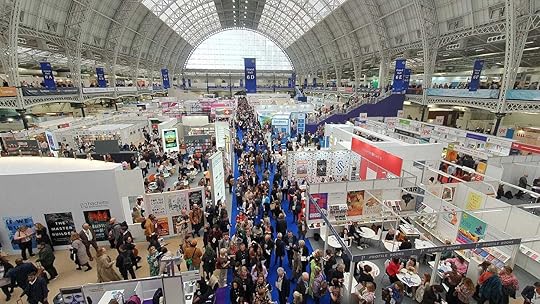
I’ve spent a couple decades adjacent to publishing as writer, magazine publisher, literary programmer and cultural convenor. I thought I knew a fair amount about how it all worked. But publishing is a complex sector subject to the headwinds of consumer whims, financial pressures and technological advances, where change is the one constant.
Publishers I ran into asked me why I was at an industry fair. The question surprised me – and it didn’t. Though a writer’s creative projects are the foundation stone for the publishing world, the granular details about its inner workings are kept deliberately opaque. This makes writers dependent on the gatekeepers of the industry – publishers, agents and publicists (yes, the marketing team has central input on whether or not your book is extended a publishing deal).
You’re meant to keep your head down and write and leave important business decisions to the professionals.
Some authors are fine with that (even if they privately grumble). I’m not one of them. I want to understand what’s at stake, where the choices are, and what I can do to best help the stories I write find their audience. Also, wearing my hat as president of Diaspora Dialogues, I need to understand what opportunities and pitfalls lay ahead for the alumni of our mentoring programs.
I founded DD in 2005 to help emerging writers develop both their craft and their career. In 2019, an anguished DD alumni told me she wasn’t sure she’d write another book. She’d loved our program and publishing her first novel. But the process of trying to wrangle any media or bookstore attention was disheartening. If the process had been more transparent so she knew better what to expect, would her experience of publishing have been so negative, she wondered?
The conversation haunted me. Afterward, we more than doubled DD’s professional development seminars we hold to demystify the industry, make professional connections and build community.
I believe it’s incumbent on any writing program, and certainly those who charge a fee such as an MFA in Writing Program, to accurately detail the world of publishing to those who have entrusted their creative future (and scarce dollars) to them.
Thus, wearing the two hats, I took myself off to London. And what an enormously valuable decision that turned out to be. For three days I’d walk ten minutes from the hotel to Olympia London, the 140-year-old exhibition hall, and line up with tens of thousands other delegates to enter. Each day supplied back-to-back seminars and workshops on multiple stages including the Main Stage, the Authors HQ, the Tech Theatre, Literary Translations Stage, English Pen Literary Salon, Sustainability Lounge and more. I also attended the Writers Summit at Chelsea Old Town Hall.

I’ve decided to share what I learned in a special issue of Letterbox: Bookish & Filmish this week (Publishing Trends and The Writing Life) and next (Social Media and Indie Publishing). They will be of interest to writers, and those readers keen on a behind-the-pages look at the world of writing and publishing. For everyone else, I’ll see you for a regular version of Letterbox in May!
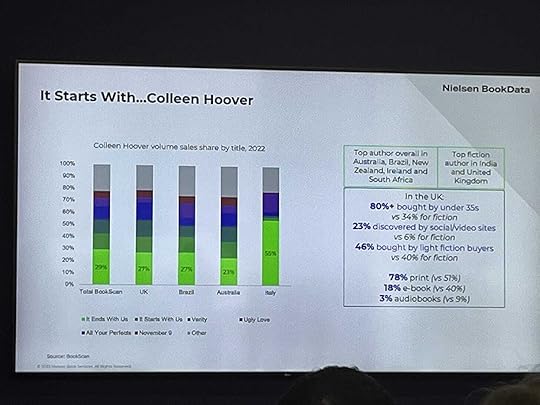 (Aka the power of #BookTok. But more on that next week.)Publishing Trends
(Aka the power of #BookTok. But more on that next week.)Publishing TrendsLike politics, publishing has become a story of extremes. On the one hand, a small number of authors score a six or seven figure advance from one of big 5 publishing houses often through an auction that’s designed to drive hype. This in turn generates media buzz, the promise of a bigger marketing spend (publishers looking to recoup their investment), better bookstore placement, and a greater chance at TV/film adaptations.
At the other end of the spectrum are the majority of writers. They publish with independent presses, receive $5,000 advances (or lower), and often struggle to generate sales in an over-crowded market amidst the manufactured buzz of ‘big’ books.
There used to be a middle path, where writers received advances of $15-25k, mostly from the larger independent publishers, or smaller imprints of the big 5. But the channel to that scenario has narrowed so dramatically, as one agent described it, that it’s almost nonexistent.
Why is this? Expenses (cost of paper, freight and labour) have increased faster than revenues. The price of books changed little in the past decade, even while the cost of other entertainment items such as music or film or streaming services has gone up. Thus, the relative value of books is high, but how does one increase the jacket price at a time when people are struggling to pay their rent or feed their kids due to inflation?
Although book sales were mostly flat in 2022, and the same is true so far for 2023, there were lots of bright spots discussed at the fair. Libraries have led a surge in new readers. New bookstores, in particular local ones, are opening as readers re-discover the wonderous serendipity of browsing in person. Barnes and Noble in the US banished the tchotchkes in favour of books (are you listening, Indigo?) and for the first time in twenty years, are expanding.
And finally, there seems to be a collective sense that books have made their way past the peak challenge of competition from streaming services such as Netflix, Amazon Prime and Disney+. Streamers found their churn rate of shows to be too high – everyone consumed everything during the pandemic – and thus their costs. They’ve returned to the old model of dropping episodes once a week in order to trim expenses while increasing their subscription rates.
(Like many, I have a binge hangover from the past three years of the pandemic, and am entirely happy to watch less, savour more and turn back to reading.)
A final note on those big advances all writers dream off. Turns out that, like lottery ticket winners, scoring a major advance is not a guarantee of long-term success. In fact, too often it’s the opposite, and some writers find themselves a decade later dropped by their publisher after their books didn’t earn out, or with dramatically reduced amounts for subsequent contracts. There’s been a lot of Twitter traffic on the subject the past couple weeks. Many agents argue it’s better to start with a low advance and have publishers think they are building you up.
And a final, final note on the utility of Twitter. Although the general feeling seems to be it’s a platform of the past (more next week), Book Twitter’s greatest strength is the presence of writers, editors and agents who candidly share information about the industry. Managing realistic expectations should be to everyone’s benefit.
I follow many agents, publishers and booksellers, well as related hashtags. There is also lots of good insights to be had here on Substack. Some industry-related newsletters I follow include SHuSH, Agents & Books, and Pine State Publicity.
Literary Adaptations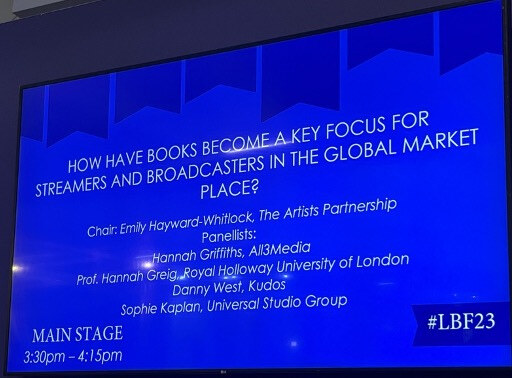
On the first day of the fair, I sat in on a fascinating conversation about current trends for TV/film including Literary Adaptations. The panel conversation included a top British agent, three British producers and an American studio exec.
It got a little prickly when one of the Brits protested all the Americans buying up UK production companies and with it writing talent that had been nurtured over the years by BBC and others. But Universal Studio’s Sophie Kaplan wasn’t daunted. It was a marriage made in heaven, she said, each bringing to the table their strength: American money and UK talent. (It’s really tough economic times in a post-Brexit UK, especially outside of London.)
A summary of the convo: There’s a strong appetite from studios and production companies to adapt books versus create new content. But the focus has narrowed on the range of projects that buyers are looking for.
Yes to fun, feel-good and romance; everyone wants the next Emily in Paris. No to science fiction/fantasy, dystopia or anything too dark. Yes to returning series and procedural crime (case-a-week Law & Order type stories), no to episodic limited-run series where the plot runs across one season. Lessening interest in true-crime, although always a market. Common wisdom says it’s now hard to pitch historical projects but in the UK they are happening, and the audience is there. And everyone wants a strong female protagonist.
I’ve just finished watching Night Agent on Netflix, which is a limited run, ten-part series with dark subject matter (my favourite kind). Season One was the third highest watch show ever on Netflix and the streamer immediately greenlit the series for a second season, thus breaking all the rules in the above paragraph. Predicting the appetites of tv buyer seems to be a moving target, but they’re all trying.
The panel’s advice for writers? There is a definite, on-going interest in literary adaptations. It’s seen as shortcut since the world of the story has already been created and a book brings with it an existing audience.
Studios also now strongly prefer the author to be involved in production, either as a writer and/or executive producer. Who knows the existing world better than the author? But pitches must go through agents or book scouts. Commercial titles have a better shot than literary ones and of course, bestsellers the best chance of all. They’re paying attention to the publishing industry news, and large advance deals gets their attention.
For authors whose books don’t fit that mold or who are interested in screenwriting generally, they suggest creating a strong writing sample as the best calling card. Be very specific about your voice in the writing sample, they say, because that’s where you’ll be pegged for consideration on other projects.
A final thought: US buyers now have a greater eye towards the global audience (and the flushest budgets). They’re looking for stories set in a defined locale and that feel authentically rooted in place, but with a universal message and appeal.
Writerly AdviceOne of the things I found most refreshing in the speakers across all panels at LBF 23 was a straight-forward acknowledgement that writing is a career, not just a calling, and that talking about money and strategy is not only advisable, it’s the responsible thing to do.
The London Book Fair is very much an industry event. There is no consumer facing element: the books on display in the publishers’ booths are props, small tables are set up for pre-established meetings in 30-minute increments and access to the booths or the agent area is strictly controlled.
But still, there are writers present who give talks. Big names who are the writers of the day like Ann Cleeves, Colson Whitehead or Robin Stevens. Authors appearing in events designed to raise profile of specific regions, genres or in translation. And writers giving advice to writer delegates (which seemed to number a few hundred) on the Authors HQ stage or during the writers summit. These were so overpacked that each one had 50-75 attendees forced to stand or sit on the ground when the chairs ran out.
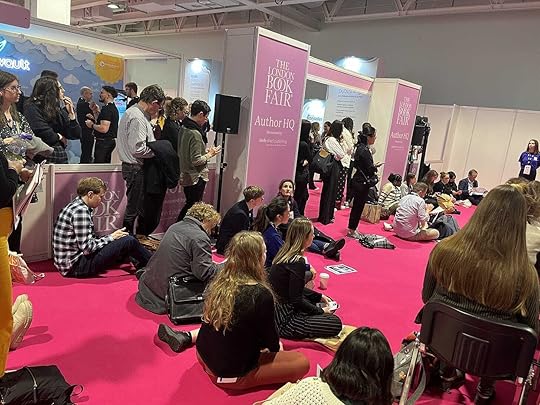
The following is culled from the many panels I attended:
👉 Have a sense of self and a game-plan for your writing career.
👉 Be strategic. You are CEO of your own business. Take care of yourself and find your balance.
👉 Be realistic that your ability to write full-time and support yourself is highly unlikely. You’ll need to generate income (or support) elsewhere.
👉 In pitching agents, the most critical thing is to personalize the approach. Look at their manuscript wish-list, their favourite books, clients they represent, etc. There is no end of good advice online with specifics about writing pitches and queries, but agents say that the most important you can do is know you’ve targeted them for a specific reason and not as part of scattershot approach.
👉 With a pitch, build curiosity. Don’t be verbose. Make use of the title with pride. Make clear the target audience and use language in the pitch that is evocative of the thematic flavour of the book. Use book comparators but do them well.
👉 It’s really critical to get the right fit with an agent, especially if you wish to write across genres, given that the market likes simplicity and for writers to stay in their box.
👉 In the UK and US, agents and publishers seem to pay attention to emerging writers who have taken writing courses with Curtis Brown Creative or the Faber Academy. (Though every writer I met who did was critical of their utility.)
👉 Shamelessly use personal contacts because it’s so hard right now to get an agent (many estimate 90% of queries are not read unless they come through a referral) and a publishing deal.
👉 Technical advances and reduced barriers to legitimacy make indie or hybrid publishing a viable option (and possibly a better paid one) for those willing to invest effort and money. (More in next week’s newsletter.)
👉 And finally, remember it can take a very long time for anything to happen but when it does, it can all happen very quickly. It’s one part luck, one-part hard work, and you can’t guarantee the luck. So define what success means for you (Your book published? Seeing it on a shelf in a bookshop? Getting invited to a literary festival? Making a bestseller list?). And the first, last and most important advice:
👉 Just keep going.
Writing and publishing is a difficult path, but presumably you chose it (or it chose you) because there’s no other choice. You have stories to tell, and you want those stories to have readers. It takes a village, but ultimately the central decision maker should be you. Tune in next week for a detailed look at social (in particular IG, Twitter and TikTok) and indie publishing.
With you in community. 👊
Helen
April 11, 2023
Letterbox: Bookish + Filmish
When my sisters and I were bored or listless, depressed or anguished, our mother would inevitably say, ‘you need a project.’ It set our teeth on end.

Did she not understand the nature of heartache? The cruel injustice of the world that handed things to other people – whether that was a loving partner, a paying job, good health or the opportunity to chase your dreams – and denied it to you?
Thanks for reading Letterbox! Subscribe for free to receive new posts and support my work.
We wanted to wallow in our misery. Not get on with it, which was the inevitable message at the heart of the Scottish sayings she peppered our lives with:
“Keep the heid!” (Keep calm; get on with it.)
"You're a wee scunner!" (You’re a little whiner.)
“Failing means yer playin!” (You may be failing, but at least you’re trying.)
“Whit’s fur ye’ll no go by ye!” (Fate will deliver what’s meant for you. The inspirational one – Scottish style. )
My mother was raised by a long line of stubborn, loving matriarchs who had done just that through difficult times, including my mother’s childhood polio in 1940s war-torn Britain, with food rations extremely tight and a father away at war.
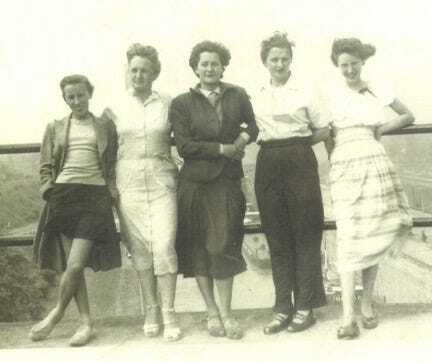
My great-grandmother would walk my mother by the seaside for hours a day in the belief that sea air would cure the polio, then one of the most feared disease in the world, with affected children often depending on an iron lung for survival. A vaccine was still fifteen years away, and medical staff scarce.
In 1945, my mother would go on as a child to live in Karachi (India, until partition) and Kowloon in Hong Kong, when her father joined British Overseas Airway Company to work on sea-plane airports. There was also a year quarantined on a houseboat on the Nile after their immunization papers were stolen.
(Proving vaccination in order to travel is nothing new. Adults used to be able to do it without being wee scunners about it, shutting down cities or borders. . .)
Eventually, the family made their way to Canada where my teenager mother promptly fell in love with a handsome, Irish Catholic life-of-the-party whirlwind, just about the worst choice possible in the eyes of Scottish Presbyterian parents.
My parents-to-be eloped to Cork, settled in London, had three daughters and emigrated to Canada to have the fourth. Loved, laughed, fought, divorced, met other people, got cancer, got better, got sick again. The usual human experience.
My mother, Jessica Wilson Burton (Walsh, for a few decades there) passed away in late February in her 86th year. Herself an author, as well as beloved mother, daughter, sister, grandmother and great mother. Career woman and provider. Gatherer of lonely people, convener of large dinner parties. Firm believer that all people are created equal, respect is earned, and injustice must be fought.
Her loss has left a wound in me so raw that six weeks later I’m still unable to finish her obituary. I’ve told almost no-one people (until now. . .) because saying it out loud risks meaning it’s actually true. We were so close and I feel alone, although of course I’m not. I have a partner, three sisters with shared memories and loads of extended family – really, I’m so fortunate.
But our parents, in particular our mothers, are the ultimate origin story. And, as every successful Hollywood franchise knows, there’s nothing more compelling to humans than the mystery of the beginning.

It’s the chimera that promises completion, insight so profound we’ll finally understand who our parents were as people, whether they loved us enough and why they acted in the way they did (insert behaviour A, different for everyone but inevitably there) that left us feeling somehow incomplete.
I’ve work with hundreds of emerging writers through the literary organization I founded/run, Diaspora Dialogues. I’ve read thousands of fiction, non-fiction, poetry and drama submissions. The most consistent thread despite differences in age, gender/gender expression or cultural background, is the inner child looking to bridge an unknowable distance to their parents and thus heal themselves.
Somewhere in my 30s, I realized my mother had been right about most things. Saving yourself (with help as necessary) does feel better than waiting to be saved by others. Keeping busy does help you through difficult times. And contemplation can be found in action; meditation in movement.
One day in March, lying on the couch with a box of tissue, I reached out for my cup of tea and knocked over a tall pile of unread newspapers and magazines. Out fell a NYT section dedicated to soups. Hello mother, I thought to myself, as I sat up, and started flipping through the pages.
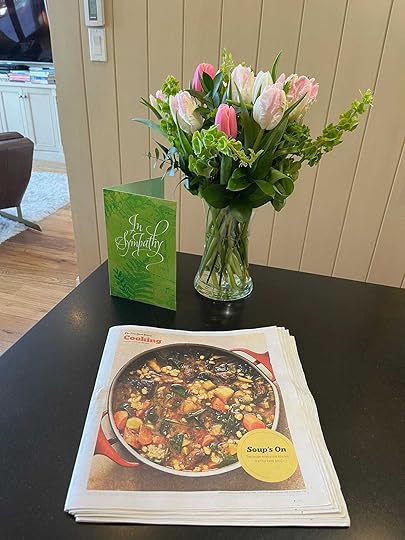
If any of us had a cold, my mother would head to the fridge for onions, carrots, and celery to make lentil soup. When she was diagnosed twelve years ago with cancer, I got cracking on big pots of bone broth and casseroles. In our childhood there wasn’t much money for restaurant meals, but there was a crock pot, a pressure cooker, homemade meals and a fundamental belief in the power of real food to heal.
In the past few weeks, close friends have asked if I felt my mother’s presence around me. I’ve been embarrassed to say no. No art at a tilt. Furniture in the wrong place. Objects mysteriously moved. Why wasn’t she haunting me, I wondered. What was I, chopped liver?
But with the NYT in my hand, I suddenly felt her there. None of this ethereal wafting about for Jessica Wilson Burton; only direct action would do. I rose to my feet, jotted down an ingredients list and walked to the store.
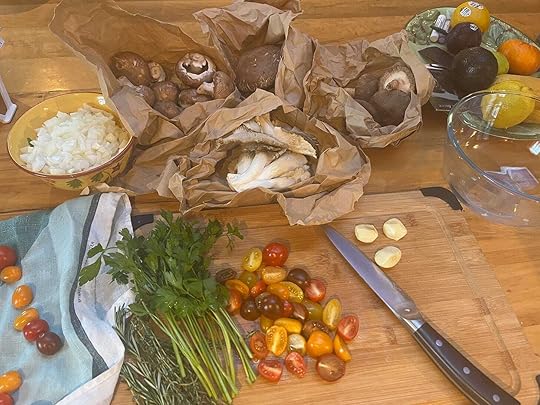
My new project? I’m working my way through all twenty-four receipts in the NYT pull-out. I don’t eat pork, rarely eat beef or lamb, and the idea of pickles in a soup kind of makes me gag. But I’m just going with it, cooking one by one by one. Feeding the people I love and starting to the ring-fence the void.
No lives are being saved through my project; no injustices fought. But sometimes the greatest insights come from small and intimate rather than large and earth-shattering. Along the way, I’m writing a longer piece, a meditation on the mother-daughter relationship, on memory and belonging, and the nature of grief and joy.
Cooking is like love. It should be entered into with abandon or not at all. – Harriet van Horne
Only the pure in heart can make a good soup. – Ludwig van Beethoven
À la prochaine, Mom. ❤️
Festivals.I’m off in a few days back to London. The London Book Fair, a sprawling “global marketplace for rights negotiation and the sale and distribution of content across print, audio, TV, film and digital channels” takes place 18-20 April, and I’m attending for the first time.
The in-person event usually welcomes more than 25,000 publishing professionals (writers, agents, publishers, scouts, etc) as well as the general public. While not quite up to 2019 numbers, it’s anticipated to be 30% busier than last year (the fair was virtual in 2021 and cancelled in 2020) with the return of a significant number of international attendees.
I’m going for a combination of meetings and networking, a series of professional seminars and talk, and a full-day Writer’s Summit. I was fortunate to sell my first book, Pull Focus, without an agent, but feel I would benefit now from strategic guidance as I have a new manuscript, another on the go, and film/tv scripts in the works. I’m on the hunt for the right agent. Wish me luck (or send me a referral)!
I was delighted to see Janika Oza, an alum of our Diaspora Dialogues mentoring program, included in this Publisher’s Weekly article about buzzy upcoming books being promoted at the LBF. It’s been amazing to see so many DD alum published the past several years (6 this spring alone) or signing publishing contracts. The depth of talent in our programs is extraordinary, and we’re rooting for everyone’s success.

For those in Toronto, you won’t want to miss Word on the Street’s upcoming festival, May 27-28th in Queen’s Park or #Motive TO, the crime and mystery festival produced by Toronto International Festival of Authors, June 24th. I wish I were in Toronto 17 April for TIFA’s event featuring Mellissa Fung and Louise Penny, at Winter Garden Theatre, my favourite Toronto venue. Tickets HERE.
This spring’s Hay Festival 25 May-June 4 in Wales also has a fantastic line-up. Love the format they’ve evolved since I was there in 2018, with its focus on preparing people for direct action on food, health and environmental sustainability; exercise (morning yoga, lots of walking tours); issues of the day; author talks; cross-disciplinary events (concerts, comedy shows, news quizzes, etc). There’s nothing more magical than being immersed in art and conversation amongst rolling countryside.
The BBC has a major programming presence at UK literary festivals. I’ve never understood why CBC doesn’t do similar in Canada.
Spring Books and Films.In my last newsletter, I listed films I was due to see at Sundance Festival in Utah. Sadly, I didn’t use many of my tickets, as I rushed home early to be with my mom when she was first hospitalized for the first time. One I saw, Past Lives, left me deep in gratitude for art that moves the soul and engages the imagination.

The film follows Nora And Hae Sung, two deeply connected childhood friends torn apart when Nora’s family emigrates to Toronto. They’re reunited twenty years late in NYC for one fateful week “as they confront notions of destiny, love and the choices that make a life in this heartrending modern romance.”
Heartrending, it certainly is. And extraordinary. Past Lives is the debut film by writer/director Celine Song who, like her protagonist, grew up in South Korea, emigrated to Toronto as a young adult, then eventually moved to New York to become a writer. (Celine is a playwright and now a filmmaker.) Past Lives opens theatrically June 2/23. This film will be buzzy come award season; don’t miss it!
I’ve been enjoying lots of great television shows on the streamers – mostly BritBox, Prime and to a lesser extent Disney+. I’ve found Netflix less compelling lately.
They adapted A Spy Among Us, by one of my favourite non-fiction authors Ben McIntyre, whose most recent book Colditz: Prisoners of the Castle I’m currently reading. The writing is excellent, as is the acting by Damian Lewis (Wolf Hall, Billions, Band of Brothers) and Guy Pearce (a filmography too long to list), though I’m not a fan of the dark cinematography of many UK shows.
Other series recently enjoyed: Shrinking on Apple+ for half-hour comedy and the unbelievably good adaption of Mick Herron’s Slow Horses (currently shooting Season 4 in London); The Bay and Beyond Paradise on BritBox; always The Mandalorian on Disney+ because it’s a hard heart that doesn’t love the Baby Yoda and Only Murders in the Building (new season soon!) where people die, and somehow it feels innocent.
I’d also like to see Rabbit Hole, the new series starring Kiefer Sutherland on Paramount+. They location scouted our cabin for the series, which was shot north of Toronto, but decided in the end it wasn’t derelict enough!
**
Below are a few of the Spring/Summer novels I’ve bought or will buy. A tsunami of titles get published every season; estimates say 3 million titles (traditional + self-published) annually in the US alone. (This depressing article about the current state of publishing been making the rounds on social.)
Rebecca Makkai, I Have Some Questions For You, which follows a L.A. podcaster who goes returns to her boarding school and obsesses about a murder that took place there in the 1990s. I’m queasy about the morality of true-crime, where the audience risks being a participant in the re-victimization of families. But it’s propulsive, and squarely at the centre of our current zeitgeist. (Of course this book is already optioned with planned adaptation into a series.) Feb 2023.
Kevin Jared Hosein, Hungry Ghosts, set in 1940s Trinidad, tracing various members of a multiracial community grappling with poverty, emotional connection, and hereditary pain. Feb 2023.
Catherine Hernandez, The Story of Us, the story of Mary Grace, a Filipina PSW who arrives in Toronto with the hope of building a new life and sponsoring her husband and children, only to find belonging and family in unexpected ways. Feb 2023.
Zoe Whittall, The Fake, a deeply human novel about the scammers amongst us. March 2023.
Deepti Kapoor, Age of Vice, cinematic novel set in New Delhi that straddles the line between commercial and thriller and is getting excellent reviews. March 2023.
Lucinda Williams, Don't Tell Anybody the Secrets I Told You: A Memoir. Okay, it’s not a novel, but I read memoirs as fictional constructs since insight is subjective and memory is faulty. I’m a big fan of her music. April 2023.
Kate Morton, Homecoming, an eerie epic involving a wealthy family’s mysterious deaths in Adelaide Hills, South Australia. April 2023.
Denise Da Costa, And the Walls Came Down, a beautiful novel about family, identity, love and loss. (I blurbed this book. It left such an imprint I’d wake up thinking about it.) June 2023.
Katherine Reay, A Shadow in Moscow, because I love myself a good spy novel, especially one with finely researched details. June 2023.
Daniel Silva, The Collector, the latest in his Gabriel Allon spy thriller series that also involve the art restoration world. I’ve read them all. July 2023.
Zalika Reid Benta, River Muma, a magical realist novel about a millennial Black woman who navigates her quarter-life-crisis while embarking on a quest through the streets of Toronto. August 2023.
Substack warns me this is getting too long, so Industry News and Gossips will make a reappearance next issue including crazed book bans, a threatened return of the millennial music debacle the Frye Festival (a fictionalized version of which is in my second novel), and debates about how AI/Chat GPT will ruin everything. But I’ll leave you with this Esquire article about how President Obama chooses his reading lists.
All book buzz is manufactured. Like politics, publishing has seen a hallowing out of the middle in favour of the extreme ends of the bell curve: the bestsellers and the books that sell 300-500 copies. The days when a writer might live by selling 25,000-50,000 copies (combined with income from teaching, working, grants, spousal supports, etc) is gone except for very few.
There are many reasons for this, including the interest that agents/ publishers (themselves operating on thin margins) have in promoting those books/writers they’ve invested the most time and money in, and where they stand the best chance of an economic return. Hence the narrowing of the buzz.
A bestseller doesn’t mean a book is better than most other books. Nor does its ability to generate media attention, inclusion on ‘best-of’ or ‘highly anticipated’ lists. This stands true for my own list above. For every book I chose, there was another 25 on my immediate radar screen I could have chosen. Ten times that amount with a little research. Buzz means that luck and the marketing machine has shone their magic on a particular title, and agents/publicists have spent considerable time pitching and re-pitching editors with whom they’ve developed relationships over drinks over the years.
(For writers on this list, this blog post by publicist Cassie Mannes Murray about why some books catch fire is super interesting.)
Spoiler alert: the Esquire article digs but is unable to find evidence that the former president’s book recommendations are engineered by anyone other than himself! It’s surprising to me, given what I know about the industry. But a) if anyone is going to rise above expectation it’s President Obama, and b) how wonderful to be surprised by ‘the better angels of our nature’ to quote another US president.
Bye for now. Thank you for joining me for this twentieth issue of Letterbox. Please connect with me @HelenWalshBooks on Twitter, Facebook, Instagram, TikTok, Linked-In or via my website www.helenwalsh.ca
Thanks for reading Letterbox! Subscribe for free to receive new posts and support my work.
January 23, 2023
Letterbox: Bookish & Filmish
Hello stranger. It’s been a while.
While the Prince Harry memoir Spare breaks bestselling records, and British journalists sneer yet gobble up every available column inch to denounce it (apparently despising the media pretty much guarantees they despise you back. . .), I’m here to talk about the Queen.
And I don’t mean Elizabeth II.
Last May, we took a transatlantic crossing between New York and Southampton, England on the Queen Mary 2, decades after my parents and three older sisters emigrated to Canada on another ocean liner, the Empress of Canada.

It was my first time on a large ship. “It’s a liner, darling,” one man corrected me at lunch when I used the ‘s’ word. An even greater faux pas, it turns out, is to call it a cruise. Ocean liners are designed to undertake a line voyage, between point A and point B, across a large expanse of open ocean, while cruise ships voyage closer to the coast, sailing between ports.
Until Covid hit, taking a transatlantic crossing had been a distant kind of bucket list item. It moved up the priority scale after watching travel documentaries on television during lockdown, including one about the building of a Cunard liner and the role the company played in the history of emigration to North America.
Over the years, I’d passively consumed references to ocean crossings in books and films. I had vague ideas of sitting on windswept decks, covered in woolly blankets with a tea tray beside me, reading while we slowly crossed the ocean. And in fact, I did just that, repeatedly.
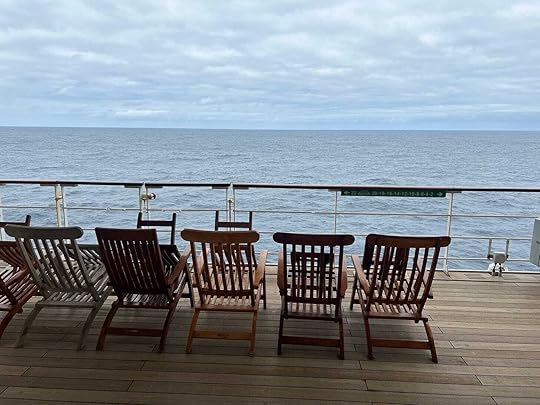
On board, there’s a long corridor outside the planetarium with large historical photos of writers, actors, politicians and celebrities who frequented the Queens. A walking history tour including these two leading ladies:
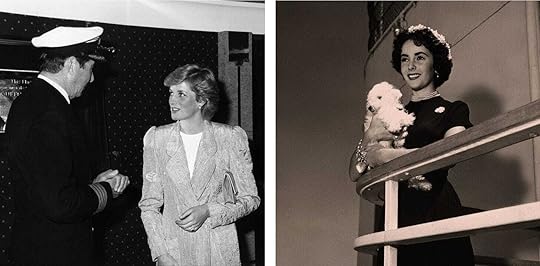
Choosing a transatlantic crossing as your first major trip after onset of the pandemic began may seem an odd choice. We all watched newscasts in 2020 about ghost boats refused entry at ports, sick passengers locked in cabins, families worried about how to repatriate people or bodies home.
And, certainly, we choose our risk battles on the liner, wearing masks in the 700-seat theatre for performances and avoiding elevators, buffets and sing-a-longs.
But, from the moment we set sail from New York under the Verrazano bridge out to sea, glass of bubbly in hand, it was pure heaven. Gazing out at nothing but water (and a spectacular lunar eclipse one night) was very Zen after the fears and frustrations of the previous two years.
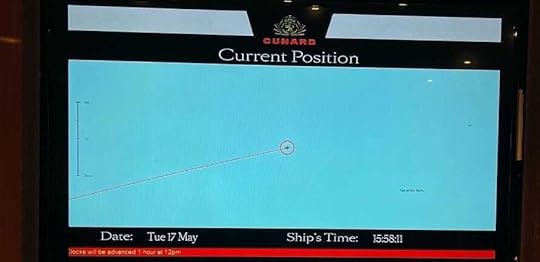
Imagine: Silence from telephones and digital chatter in favour of books and conversation. The sense of letting go that comes with sinking into one place for an extended time. And of course, the luxury of being pampered.
Originally, we booked into a Princess Grill suite, helped out by discounted post-recovery fares. But Cunard’s sophisticated sales apparatus kicks in; they offer repeated upgrades for modest sums as their more expensive rooms go unsold closer to voyage time. Hook firmly sunk, they reeled us up the luxury ladder until we ended up in a Queen’s Grill suite with private balcony and butler service.
The difference? A designated table in the best restaurant on the ship, with Osman, the maître d’, asking daily what special order he might arrange for our supper. Dover Sole Amandine prepared table-side? Lobster Thermador? Why not Crepes Suzette for dessert? Breakfast served to the suite on Wedgewood China, or canapés appearing at 5pm as if you hadn’t spent all day eating and had a multi-course dinner ahead.
Late at night, we’d return back to the room after a black-tie evening to find the bed turned down, chocolates on the pillow and our robes and slippers laid out, waiting, like a warm cuddle.
Heady stuff after two years watching Netflix in a hoody and some leggings, or making endless New York Times pan sheet recipes for dinner.
Life on board is a bustle. Each evening, they slip a news digest (your home country + the UK) and the next day’s itinerary of events in your room’s mailbox. The itinerary covers four pages, single spaced. There are painting and dance classes, LBGTQ+ meet-ups and wine tastings. History lectures and film screenings. Talks in the planetarium and musicals on stage. Orchestras and discos.
We’d chosen the Olivier Theatre Awards crossing (several voyages are arts-themed). Each night a different performance of an award-winning musical from Broadway or London’s West End hit the stage. During the day, the actors and directors and producers held a series of masterclasses, from dance choreography to production design to writing and directing.
In the Queen’s Grill restaurant, a retired surgeon from San Diego and his 30s husband sat at the table next to us. They were crossing from NYC to Southampton, staying a week in London, then taking a Cunard cruise up into the Fjords, before rejoining the Queen Mary 2 back to New York. Zoran and Richard were smart and funny, and we often met up with them post theatre for drinks and dancing.
At the table on the other side, Sally and Steve from Texas, were just as friendly as could be. And at the end of the row, musician Dave Stewart (from the Eurthymics) covered in tats and wearing his trademark porkpie hat, travelled with his wife, the Dutch photographer Anoushka Fisz.

Our voyage was the first transatlantic crossing of the Queen Mary 2 since lockdown. For the 1300 crew, it was a relief to get back to work. We learned that the majority of Cunard passengers are repeat, and that it was not uncommon for them and the crew to form long-lasting friendships, as they meet repeatedly over the years.
A RMT in the spa told me she had clients who lived year-round on a ship. With aggressive discounts for regular or long-voyage customers, all-in food services and a full medical team on board, it was economically comparable for seniors to live there, versus an upscale seniors’ home. These residents usually dock for a week or two around the holidays; Cunard stores their belongings and ensures they get their regular room back upon their return.

The Queen Mary 2 has twelve decks; staff cabins are on the lowest. We explored all other parts of the liner but as soon as we alighted from the stairs onto Deck 1, it felt like we were trespassing into a private realm. We lingered only long enough to read the giant murals about the history of the Cunard line, watch as chefs bustled here and there or people went into the medical clinic, before scampering away.
(The food on board was remarkably delicious and varied given it must be provisioned for seven nights at a time. Osman explained that the liner has separate fridges for everything, set to the exact temperature needed to preserve maximum freshness. So, the lettuces have a cooler separate from the blueberries separate from the asparagus, and so on.)
Michael and I wrote during the day, mostly on our balcony, sometimes visiting the library or art gallery.

We also took full advantage of the gym and the spa, got our steps in walking miles around Deck 7’s outdoor promenade (hanging on to the railings on very windy days) and splashed out at night.
Occasionally, you’d hear an announcement asking a passenger by name to immediately return to their cabin. We had a running bet whether their credit card had bounced (shop or casino or alcoholic beverages are not included) or whether they had tested positive for covid.
Our last night on ship, a letter was slipped under the door. “As you are likely aware, Covid is on the rise in the community and on the ship. . .” it started. We hadn’t been aware, but nor we were surprised. Thankfully, we ran into no issues.
All in all, it was a lovely way to spend the week, adjusting slowly as we moved closer to Greenwich Mean Time. Certainly a nicer way to play Queen than being born into the Royal Family.
Festivals.Greetings from Sundance Festival!

Delighted to be back after a two-year absence. Films on tap for me include:
Past Lives, a romantic drama debut by Korean Canadian playwright Celine Song receiving rave reviews as the ‘Sundance Stunner’ and ‘a perfect film.’
Fairyland, adapted from the Alysia Abbot’s memoir about being raised by a gay single father in 1970/80s San Francisco.
Fairplay, a Wall Street psychological thriller which has sparked a fierce bidding war as well as intense audience reactions.
AUM: The Cult at the End of the World, about the Japan’s infamous doomsday cult.
You Hurt My Feelings, starring Julia Louis-Dreyfus about a novelist whose world unravels when she overhears her husband admit he doesn’t like her new second book (!); a documentary on artist Nam June Paik; thriller Eileen starring Anne Hathaway that is getting mixed reviews but apparently a lot of buyer interest and the documentary Little Richard: I Am Everything.
Writing.I was so delighted that Kirkus Reviews named Pull Focus to their Best of 2022 mysteries & thrillers list !
I’ve just finished the latest draft of my second novel, tentatively titled Pull Back. It feels tighter than the previous version, thanks to terrific reader feedback from Trish Colter, Sandra Rondina, Judy Calafiore, Dee McGee, Judy Dick, Margot Pengelly and Susan Chinery.
I met these ladies through a book club group when they invited me to speak about Pull Focus. Their comments were so insightful, I asked if they might act as first readers for this new novel. And they very kindly agreed!
We met over Zoom in October, and their enthusiasm and critique spurred me to dig back in again, in particular to rewrite the ending which was too rushed. But in doing so, to start again from page 1.
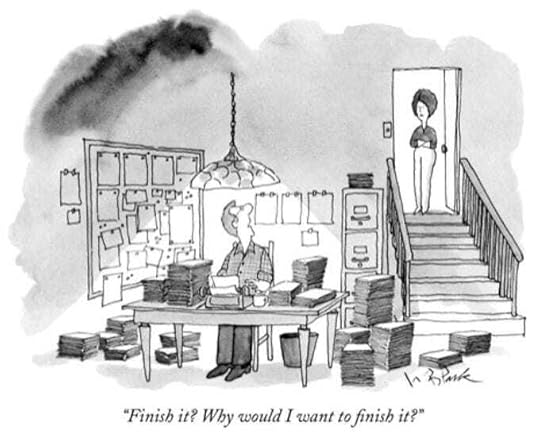
I’ve also been doing some screenwriting (a draft TV pilot episode of Pull Back and a rom-com set behind the scenes of Cannes, Venice and Sundance film festivals). It’s been fun to move between the two genres of writing.
In November, I served as Writer-in-Residence for Open Book, a website devoted to Ontario-based publishers and writers. From How to Cook a Book (a tongue-in-cheek recipe for writing and publishing your first book) and How to Cook a Look (reinvention after trial by fire) to Writing Compelling Characters inspired by a visit last August to the Borghese Gallery in Rome, all the pieces are available HERE.

I adapted the “How to Cook a Book” recipe into a talk, which I gave at the B&R Club in Toronto in November at the kind invitation of Jane Gibson. The conversation with the lively, receptive audience was super fun.
News & Gossips.Adult fiction sales rose in 2022, led by romance titles (52% increase), with fantasy titles second, followed by graphic novels. This includes the TikTok drive phenom that is romance/thriller author Colleen Hoover. CoHo, as she’s referred to, has possessed three or four spots on the New York Times Bestseller list the past several months drive by enthusiastic #BookTok readers.
Meanwhile, non-fiction sales dropped by 10% with only one subcategory – travel – posting an increase. Traditional heavyweight categories of history, law and political science saw double digit drops.
After three years of the pandemic, with increasingly fraught political climates and fractured societies around the world, it’s no wonder escapism is all the rage.
**
I didn’t know of Albertan cookbook author Jean Paré until I read about her in the New York Times Canada Letter.
Ms Paré switched careers at the age of 54. And when the male-dominated industry refused to print her first cookbook, declaring the recipes too sweet, she founded her own publishing company, going on to publish more than 30 million copies.
“What do they know about what women want in a recipe?” she asked of the male publishing execs.
Ms Paré died in December at the age of 95. Clearly sugar intake didn’t stop her from living a long life – she was known for ordering dessert first or celebrating a special occasion by ordering EVERY dessert. The excellent NYT obituary can be read HERE. (It’s behind their paywall.)
**
I’ve been keeping a list of interesting Spring 2023 titles which I’ll share in the next newsletter!
Bye for now. Thank you for joining me for this nineteenth issue of Letterbox . Please remember to:
Letterbox, Edition 19
Hello stranger. It’s been a while.
While the Prince Harry memoir Spare breaks bestselling records, and British journalists sneer yet gobble up every available column inch to denounce it (apparently despising the media pretty much guarantees they despise you back. . .), I’m here to talk about the Queen.
And I don’t mean Elizabeth II.
Last May, we took a transatlantic crossing between New York and Southampton, England on the Queen Mary 2, decades after my parents and three older sisters emigrated to Canada on another ocean liner, the Empress of Canada.

It was my first time on a large ship. “It’s a liner, darling,” one man corrected me at lunch when I used the ‘s’ word. An even greater faux pas, it turns out, is to call it a cruise. Ocean liners are designed to undertake a line voyage, between point A and point B, across a large expanse of open ocean, while cruise ships voyage closer to the coast, sailing between ports.
Until Covid hit, taking a transatlantic crossing had been a distant kind of bucket list item. It moved up the priority scale after watching travel documentaries on television during lockdown, including one about the building of a Cunard liner and the role the company played in the history of emigration to North America.
Over the years, I’d passively consumed references to ocean crossings in books and films. I had vague ideas of sitting on windswept decks, covered in woolly blankets with a tea tray beside me, reading while we slowly crossed the ocean. And in fact, I did just that, repeatedly.

On board, there’s a long corridor outside the planetarium with large historical photos of writers, actors, politicians and celebrities who frequented the Queens. A walking history tour including these two leading ladies:

Choosing a transatlantic crossing as your first major trip after onset of the pandemic began may seem an odd choice. We all watched newscasts in 2020 about ghost boats refused entry at ports, sick passengers locked in cabins, families worried about how to repatriate people or bodies home.
And, certainly, we choose our risk battles on the liner, wearing masks in the 700-seat theatre for performances and avoiding elevators, buffets and sing-a-longs.
But, from the moment we set sail from New York under the Verrazano bridge out to sea, glass of bubbly in hand, it was pure heaven. Gazing out at nothing but water (and a spectacular lunar eclipse one night) was very Zen after the fears and frustrations of the previous two years.

Imagine: Silence from telephones and digital chatter in favour of books and conversation. The sense of letting go that comes with sinking into one place for an extended time. And of course, the luxury of being pampered.
Originally, we booked into a Princess Grill suite, helped out by discounted post-recovery fares. But Cunard’s sophisticated sales apparatus kicks in; they offer repeated upgrades for modest sums as their more expensive rooms go unsold closer to voyage time. Hook firmly sunk, they reeled us up the luxury ladder until we ended up in a Queen’s Grill suite with private balcony and butler service.
The difference? A designated table in the best restaurant on the ship, with Osman, the maître d’, asking daily what special order he might arrange for our supper. Dover Sole Amandine prepared table-side? Lobster Thermador? Why not Crepes Suzette for dessert? Breakfast served to the suite on Wedgewood China, or canapés appearing at 5pm as if you hadn’t spent all day eating and had a multi-course dinner ahead.
Late at night, we’d return back to the room after a black-tie evening to find the bed turned down, chocolates on the pillow and our robes and slippers laid out, waiting, like a warm cuddle.
Heady stuff after two years watching Netflix in a hoody and some leggings, or making endless New York Times pan sheet recipes for dinner.
Life on board is a bustle. Each evening, they slip a news digest (your home country + the UK) and the next day’s itinerary of events in your room’s mailbox. The itinerary covers four pages, single spaced. There are painting and dance classes, LBGTQ+ meet-ups and wine tastings. History lectures and film screenings. Talks in the planetarium and musicals on stage. Orchestras and discos.
We’d chosen the Olivier Theatre Awards crossing (several voyages are arts-themed). Each night a different performance of an award-winning musical from Broadway or London’s West End hit the stage. During the day, the actors and directors and producers held a series of masterclasses, from dance choreography to production design to writing and directing.
In the Queen’s Grill restaurant, a retired surgeon from San Diego and his 30s husband sat at the table next to us. They were crossing from NYC to Southampton, staying a week in London, then taking a Cunard cruise up into the Fjords, before rejoining the Queen Mary 2 back to New York. Zoran and Richard were smart and funny, and we often met up with them post theatre for drinks and dancing.
At the table on the other side, Sally and Steve from Texas, were just as friendly as could be. And at the end of the row, musician Dave Stewart (from the Eurthymics) covered in tats and wearing his trademark porkpie hat, travelled with his wife, the Dutch photographer Anoushka Fisz.

Our voyage was the first transatlantic crossing of the Queen Mary 2 since lockdown. For the 1300 crew, it was a relief to get back to work. We learned that the majority of Cunard passengers are repeat, and that it was not uncommon for them and the crew to form long-lasting friendships, as they meet repeatedly over the years.
A RMT in the spa told me she had clients who lived year-round on a ship. With aggressive discounts for regular or long-voyage customers, all-in food services and a full medical team on board, it was economically comparable for seniors to live there, versus an upscale seniors’ home. These residents usually dock for a week or two around the holidays; Cunard stores their belongings and ensures they get their regular room back upon their return.

The Queen Mary 2 has twelve decks; staff cabins are on the lowest. We explored all other parts of the liner but as soon as we alighted from the stairs onto Deck 1, it felt like we were trespassing into a private realm. We lingered only long enough to read the giant murals about the history of the Cunard line, watch as chefs bustled here and there or people went into the medical clinic, before scampering away.
(The food on board was remarkably delicious and varied given it must be provisioned for seven nights at a time. Osman explained that the liner has separate fridges for everything, set to the exact temperature needed to preserve maximum freshness. So, the lettuces have a cooler separate from the blueberries separate from the asparagus, and so on.)
Michael and I wrote during the day, mostly on our balcony, sometimes visiting the library or art gallery.

We also took full advantage of the gym and the spa, got our steps in walking miles around Deck 7’s outdoor promenade (hanging on to the railings on very windy days) and splashed out at night.
Occasionally, you’d hear an announcement asking a passenger by name to immediately return to their cabin. We had a running bet whether their credit card had bounced (shop or casino or alcoholic beverages are not included) or whether they had tested positive for covid.
Our last night on ship, a letter was slipped under the door. “As you are likely aware, Covid is on the rise in the community and on the ship. . .” it started. We hadn’t been aware, but nor we were surprised. Thankfully, we ran into no issues.
All in all, it was a lovely way to spend the week, adjusting slowly as we moved closer to Greenwich Mean Time. Certainly a nicer way to play Queen than being born into the Royal Family.
Festivals.Greetings from Sundance Festival!

Delighted to be back after a two-year absence. Films on tap for me include:
Past Lives, a romantic drama debut by Korean Canadian playwright Celine Song receiving rave reviews as the ‘Sundance Stunner’ and ‘a perfect film.’
Fairyland, adapted from the Alysia Abbot’s memoir about being raised by a gay single father in 1970/80s San Francisco.
Fairplay, a Wall Street psychological thriller which has sparked a fierce bidding war as well as intense audience reactions.
AUM: The Cult at the End of the World, about the Japan’s infamous doomsday cult.
You Hurt My Feelings, starring Julia Louis-Dreyfus about a novelist whose world unravels when she overhears her husband admit he doesn’t like her new second book (!); a documentary on artist Nam June Paik; thriller Eileen starring Anne Hathaway that is getting mixed reviews but apparently a lot of buyer interest and the documentary Little Richard: I Am Everything.
Writing.I was so delighted that Kirkus Reviews named Pull Focus to their Best of 2022 mysteries & thrillers list !
I’ve just finished the latest draft of my second novel, tentatively titled Pull Back. It feels tighter than the previous version, thanks to terrific reader feedback from Trish Colter, Sandra Rondina, Judy Calafiore, Dee McGee, Judy Dick, Margot Pengelly and Susan Chinery.
I met these ladies through a book club group when they invited me to speak about Pull Focus. Their comments were so insightful, I asked if they might act as first readers for this new novel. And they very kindly agreed!
We met over Zoom in October, and their enthusiasm and critique spurred me to dig back in again, in particular to rewrite the ending which was too rushed. But in doing so, to start again from page 1.

I’ve also been doing some screenwriting (a draft TV pilot episode of Pull Back and a rom-com set behind the scenes of Cannes, Venice and Sundance film festivals). It’s been fun to move between the two genres of writing.
In November, I served as Writer-in-Residence for Open Book, a website devoted to Ontario-based publishers and writers. From How to Cook a Book (a tongue-in-cheek recipe for writing and publishing your first book) and How to Cook a Look (reinvention after trial by fire) to Writing Compelling Characters inspired by a visit last August to the Borghese Gallery in Rome, all the pieces are available HERE.

I adapted the “How to Cook a Book” recipe into a talk, which I gave at the B&R Club in Toronto in November at the kind invitation of Jane Gibson. The conversation with the lively, receptive audience was super fun.
News & Gossips.Adult fiction sales rose in 2022, led by romance titles (52% increase), with fantasy titles second, followed by graphic novels. This includes the TikTok drive phenom that is romance/thriller author Colleen Hoover. CoHo, as she’s referred to, has possessed three or four spots on the New York Times Bestseller list the past several months drive by enthusiastic #BookTok readers.
Meanwhile, non-fiction sales dropped by 10% with only one subcategory – travel – posting an increase. Traditional heavyweight categories of history, law and political science saw double digit drops.
After three years of the pandemic, with increasingly fraught political climates and fractured societies around the world, it’s no wonder escapism is all the rage.
**
I didn’t know of Albertan cookbook author Jean Paré until I read about her in the New York Times Canada Letter.
Ms Paré switched careers at the age of 54. And when the male-dominated industry refused to print her first cookbook, declaring the recipes too sweet, she founded her own publishing company, going on to publish more than 30 million copies.
“What do they know about what women want in a recipe?” she asked of the male publishing execs.
Ms Paré died in December at the age of 95. Clearly sugar intake didn’t stop her from living a long life – she was known for ordering dessert first or celebrating a special occasion by ordering EVERY dessert. The excellent NYT obituary can be read HERE. (It’s behind their paywall.)
**
I’ve been keeping a list of interesting Spring 2023 titles which I’ll share in the next newsletter!
Bye for now. Thank you for joining me for this nineteenth issue of Letterbox . Please remember to:
October 10, 2022
Letterbox: Bookish & Filmish
Home again, Dorothy.
If you think adventure is dangerous, try routine, it’s lethal. – Paul Coelho
The coast of Labrador is a gorgeous thing to behold from the sky.
If you’re flying low enough, you witness the exact moment the vastness of the ocean encounters the land mass known as North America. At first, small outcroppings of craggy land struggle to contain a multitude of inland lakes too numerous to count. Then slowly, slowly, the land gains a superior foothold visible between fluffy little plops of cloud.
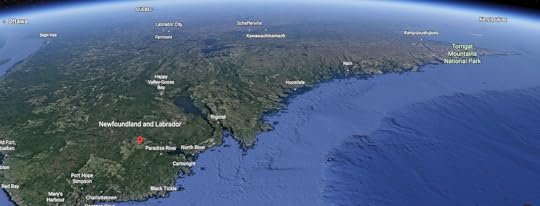
Air Canada’s 3D map spins, showing Davis Inlet and Nain to the north, Rigolet and Hopedale to the south, as we zoom 560 miles/hr towards the Churchill Falls of hydro-electric fame, and then on, 1096 miles later, to Toronto.
The airplane’s windows are mostly shut as people watch movies or doze. My earphones croon classic jazz. It feels intimate and calm – two words I seldom associate with airline travel – and I’m grateful for it.
It’s July, and I’m headed home again for a month, during a summer of unusually busy travel, as pandemic-cancelled trips reschedule, and credits threaten to expire.
I’ve taken a transatlantic crossing between New York and Southampton, England, on the Queen Mary 2, decades after my parents and three older sisters emigrated to Canada on another ocean liner, the Empress of Canada. I’ve gone to Dublin for the Irish launch of Pull Focus, bumped the previous October due to lockdown, and visited cousins in Cork.
I’ve also hung out for ten days on the Greek island of Lesvos, swimming in the warm Aegean sea and eating tzatziki and stuffed zucchini flowers and gavros (fried anchovies) at beachside tavernas with friends.
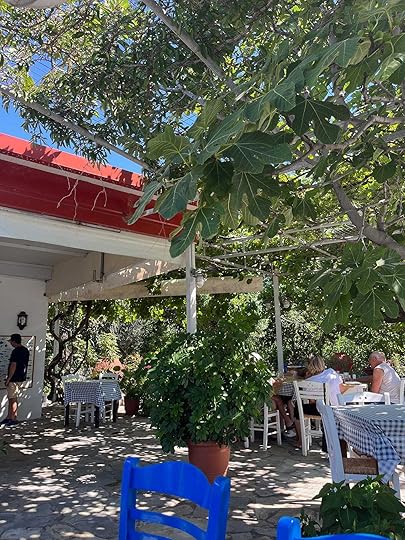
August will bring a return to Edinburgh, then onwards to Italy, riding the rails to London, the Eurostar to Paris, the sleek, beautiful electric Italian trains to Turin, Florence and Rome, interspersed with time spent in Tuscany.
But for now, I’m back home.
No one realizes how beautiful it is to travel until [she] comes home and rests [her] head on [her] old, familiar pillow. – Lin Yutang
How good it felt to decompress after the fear of the past three years. To be a traveller once again out in the world, anonymously walking streets not my own, discovering little bookshops and local writers for the first time, engaging in casual conversations with strangers on the patio of an outdoor restaurant.

Travel opens the camera lens of our mind, providing a wider angle on our ideas and experiences. It jettisons the egoistic belief there is one valid opinion, one set of norms or behaviours above all others. It reminds us we are but a speck in the historical sweep of mankind, and infinitesimally even less so in evolutionary terms.
Travel makes one modest, you see what a tiny place you occupy in the world. – Gustave Flaubert
London and Lesvos, Dublin and Cork. Readers of this newsletter won’t be surprised at my destinations, since I’ve written about them previously. I’m a creature of habit in travel, returning like a homing pigeon time and again to places that capture my soul.
The downside: so many places in the world yet undiscovered. The upside: a more serious engagement that can only come through repeat visits. Corners turned and places recognized; friendships made and deepened; a letting go of site-seeing in favour of slowing sinking in.
In Molyvos, Lesvos, the donkeys have sadly disappeared from the village in my absence – the fish are now delivered by moped. Gone, too, is The Captain’s Table, a popular harbour restaurant, after twenty-eight years in business.

Covid was so widespread in the village, the pharmacies ran out of test kits. But the managed risk of living went on, as did the tug-of-war between Turkey and Greece about contested claims to land and sea, and whose responsibility it was to care for the overcrowded, dangerous migrant ships being sent out from Istanbul or Mersin.
Meanwhile, the Dublin streets rocked. As busy as I’d ever seen the city, hordes of young people from across the world in situ (150,000 English language students come to Ireland each year), restaurants and bars bursting at the seams. Ireland had experienced a record-long lockdown, more similar to Canada than many other countries and suddenly it was Shrovetide before Lent – a time to let loose and party.
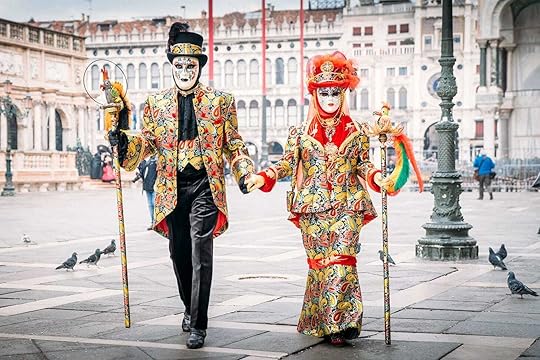
(Okay, so this is obviously carnival in Venice not July in Dublin, but the same principle of release. And since I’m currently obsessed with visiting Venice for the first time. . .)
In upcoming newsletters, I’ll write more in depth about the Queen Mary 2 experience and the role Cunard has played in North American immigration; about Italy and art tours; riding the rails and more.
But for now, I’m reflecting on all I’ve learned this summer. It’s Canadian Thanksgiving. Like harvest festivals the world over, today celebrates the end of the growing season and the beginning of the feast.
As with all rituals, Thanksgiving marks a passage of time. It offers up an opportunity to gather with friends, family, and/or our community – if we are lucky enough to have them. We give thanks for all that we have and for the people in our lives. Or we notice their absence more keenly.
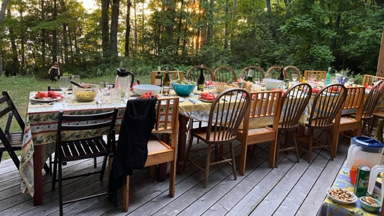
Today, I’m thinking about my tiny place in this wide world. About love and empathy, judgement and censure. I’m reading about the remarkable courage of Iranian women, the Russian bombings in Ukraine, the devastating fallout from the floods in Pakistan.
I’m thinking, too, about were we find ‘home.’ In the physical structures where we live, if we are fortunate enough to be housed. In our families and loved ones. The communities we’re born into or choose. The natural world that, to paraphrase poet Mary Oliver, offers itself up to our imagination. In the totality of our memories.
I live in Toronto, and in the countryside outside it. I also go ‘home’ to Mallow, Co Cork, where my father was from, and where he’s buried. I feel a sense of home, now, too, in Scotland, the birthplace of my mother and grandparents and all the generations that came before, after returning yearly there for almost two decades.
Ultimately, I believe, home is found in comfort and familiarity. Today, I celebrate all my ancestors who came before, the generations that will come after, and most importantly, loved ones who walk beside me in this life. Thank you ever so much.🙂

Pull FocusWe shall not cease from exploration, and the end of all our exploring will be to arrive where we started and know the place for the first time. – TS Elliot
What a great time I had in Dublin for my Irish book launch. The folks at Hodges Figgis, the 254-old bookshop, gave me a cheery welcome and were very generous spirited. They erected displays of my novel in the front window, on the ground floor and then upstairs where the event took place.
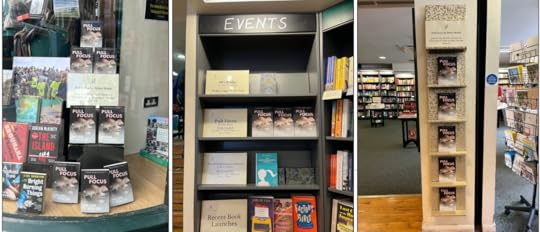
It was great craic to be interviewed by Grainne Humphreys, the Executive Director of the Dublin Film Festival and to receive from her a great compliment of novel. She said she’d be trying to explain to her mother for twenty years what she did for a living and now she could hand her Pull Focus, that’s how true to life it read.
News & GossipsI’m very proud of my partner, Michael Decter, for publishing his first novel (although ninth book) Shadow Life with Cormorant Books. It’s already getting great reviews:
A compelling novel of a man, shaken by injustice, searching for his family history. Great for fans of John Strelecky's The Cafe on the Edge of the World, Andreas Hartinger's The Brave Child. - Publishers Weekly

Shadow Life is available for sale at your favourite indie bookstore, as well as Indigo and Amazon. (US pub date is late November.) More information on his website.
**
BookToK has swept publishing the past couple years, driving up sales so dramatically (often for backlist titles) that first Barnes & Noble and now Indigo have dedicated sales tables to books reviewed on TikTok.
Rolling Stone Magazine reports this week on Penguin Random House’s attempts to co-opt the independence of creators on TikTok. Apparently already selling more books than any other publisher in the world is not enough.
PRH recently announced a ‘collaboration’ with TokTok allowing users to link to books directly in the app, compiling information including videos about the book into one location. But only their books, of course.
Inevitably, this will result in reduced opportunity for all but A-list writers including those published by independent presses – which is 85% of Canadian titles, according to ShuSh, the excellent industry newsletter by Ken Whyte.
As a writer, one is inundated by Instagram or Twitter book bloggers offering book reviews for a fee. But BookTok creators have focussed on being critics not promoters, eschewing sponsored posts. It provides them fewer options for making money, but more credibility. Will that change?
“Initially, I thought this new [feature] could have some utility,” TikTok creator Haley Thomas says. “But then it felt scummy, like, not only is this giant trying to gobble up every other publisher, but now they want BookTok?”
**
When I was ten Robin, a second cousin of my mother’s from Dunoon landed unannounced on our doorstep. None of us, including my mother, had ever met him. He had a suitcase with him.
Robin lounged around our already cramped house for months, eating everything, contributing nothing. He was also a slob – a definite strike against you, in a house run by Scottish women.
My mother despaired of him ever leaving. But Robin was family, and the memory of my mother’s indomitable Aunt Lizzy (Robin’s grandmother), terrified my mother even though she hadn’t seen her in forty years.
The saving grace in the end? Scientology. Because one day, Robin detoured off Yonge Street into the Scientology headquarters and came out with Dianetics in his hand. And suddenly the word of Ron L Hubbard was everywhere in the house.
Family might be one thing, but a cult follower around impressionable children was quite another, thank you very much. My mother steeled herself for unpleasantness as she prepared to evict Robin, but Robin didn’t require an audit to figure out which way the winds were blowing. Toute de suite he found himself a fellow seeker, and moved in with her.
I don’t know whatever happened to Robin, but I’ve been obsessed with cults ever since. My sister Debbie and I were convinced that Charles Manson was headed straight to Brampton should he get parolled. I’ve read or seen everything about The Moonies, Children of God, Nxivm, and of course Scientology.
So, I watched actor Danny Masteron’s pre-trial hearing last week on three rape charges with interest. The trial judge may say that Scientology itself is not on trial, but it’s hard to see how the organization’s command and control practices won’t be put under the microscope.
Jury selections started today in Harvey Weinstein’s LA sex crimes trial. (Weinsten was convicted of criminal sexual acts and rape in 2020 in New York; he’s currently serving a 23-year sentence, but is appealing that conviction.) The ‘Jane Doe’ in the West Coast case was just revealed as Jennifer Siebel Newsom, wife of California governor Gavin Newsom and formerly a documentary maker and actor.
And, in other sex trial news, Kevin Spacey’s trial also opened today, while Paul Haggis had his pre-trial motions in the Italy rape case struck down last Friday, and is set to go to trial October 17th.
Bye for now. Thank you for joining me for this eighteenth issue of Letterbox . Apologies for the gap since the last newsletter, and many thanks to all who wrote to say they missed Letterbox. Please remember to:
Letterbox, Edition 18
Home again, Dorothy.
If you think adventure is dangerous, try routine, it’s lethal. – Paul Coelho
The coast of Labrador is a gorgeous thing to behold from the sky.
If you’re flying low enough, you witness the exact moment the vastness of the ocean encounters the land mass known as North America. At first, small outcroppings of craggy land struggle to contain a multitude of inland lakes too numerous to count. Then slowly, slowly, the land gains a superior foothold visible between fluffy little plops of cloud.

Air Canada’s 3D map spins, showing Davis Inlet and Nain to the north, Rigolet and Hopedale to the south, as we zoom 560 miles/hr towards the Churchill Falls of hydro-electric fame, and then on, 1096 miles later, to Toronto.
The airplane’s windows are mostly shut as people watch movies or doze. My earphones croon classic jazz. It feels intimate and calm – two words I seldom associate with airline travel – and I’m grateful for it.
It’s July, and I’m headed home again for a month, during a summer of unusually busy travel, as pandemic-cancelled trips reschedule, and credits threaten to expire.
I’ve taken a transatlantic crossing between New York and Southampton, England, on the Queen Mary 2, decades after my parents and three older sisters emigrated to Canada on another ocean liner, the Empress of Canada. I’ve gone to Dublin for the Irish launch of Pull Focus, bumped the previous October due to lockdown, and visited cousins in Cork.
I’ve also hung out for ten days on the Greek island of Lesvos, swimming in the warm Aegean sea and eating tzatziki and stuffed zucchini flowers and gavros (fried anchovies) at beachside tavernas with friends.

August will bring a return to Edinburgh, then onwards to Italy, riding the rails to London, the Eurostar to Paris, the sleek, beautiful electric Italian trains to Turin, Florence and Rome, interspersed with time spent in Tuscany.
But for now, I’m back home.
No one realizes how beautiful it is to travel until [she] comes home and rests [her] head on [her] old, familiar pillow. – Lin Yutang
How good it felt to decompress after the fear of the past three years. To be a traveller once again out in the world, anonymously walking streets not my own, discovering little bookshops and local writers for the first time, engaging in casual conversations with strangers on the patio of an outdoor restaurant.

Travel opens the camera lens of our mind, providing a wider angle on our ideas and experiences. It jettisons the egoistic belief there is one valid opinion, one set of norms or behaviours above all others. It reminds us we are but a speck in the historical sweep of mankind, and infinitesimally even less so in evolutionary terms.
Travel makes one modest, you see what a tiny place you occupy in the world. – Gustave Flaubert
London and Lesvos, Dublin and Cork. Readers of this newsletter won’t be surprised at my destinations, since I’ve written about them previously. I’m a creature of habit in travel, returning like a homing pigeon time and again to places that capture my soul.
The downside: so many places in the world yet undiscovered. The upside: a more serious engagement that can only come through repeat visits. Corners turned and places recognized; friendships made and deepened; a letting go of site-seeing in favour of slowing sinking in.
In Molyvos, Lesvos, the donkeys have sadly disappeared from the village in my absence – the fish are now delivered by moped. Gone, too, is The Captain’s Table, a popular harbour restaurant, after twenty-eight years in business.

Covid was so widespread in the village, the pharmacies ran out of test kits. But the managed risk of living went on, as did the tug-of-war between Turkey and Greece about contested claims to land and sea, and whose responsibility it was to care for the overcrowded, dangerous migrant ships being sent out from Istanbul or Mersin.
Meanwhile, the Dublin streets rocked. As busy as I’d ever seen the city, hordes of young people from across the world in situ (150,000 English language students come to Ireland each year), restaurants and bars bursting at the seams. Ireland had experienced a record-long lockdown, more similar to Canada than many other countries and suddenly it was Shrovetide before Lent – a time to let loose and party.

(Okay, so this is obviously carnival in Venice not July in Dublin, but the same principle of release. And since I’m currently obsessed with visiting Venice for the first time. . .)
In upcoming newsletters, I’ll write more in depth about the Queen Mary 2 experience and the role Cunard has played in North American immigration; about Italy and art tours; riding the rails and more.
But for now, I’m reflecting on all I’ve learned this summer. It’s Canadian Thanksgiving. Like harvest festivals the world over, today celebrates the end of the growing season and the beginning of the feast.
As with all rituals, Thanksgiving marks a passage of time. It offers up an opportunity to gather with friends, family, and/or our community – if we are lucky enough to have them. We give thanks for all that we have and for the people in our lives. Or we notice their absence more keenly.

Today, I’m thinking about my tiny place in this wide world. About love and empathy, judgement and censure. I’m reading about the remarkable courage of Iranian women, the Russian bombings in Ukraine, the devastating fallout from the floods in Pakistan.
I’m thinking, too, about were we find ‘home.’ In the physical structures where we live, if we are fortunate enough to be housed. In our families and loved ones. The communities we’re born into or choose. The natural world that, to paraphrase poet Mary Oliver, offers itself up to our imagination. In the totality of our memories.
I live in Toronto, and in the countryside outside it. I also go ‘home’ to Mallow, Co Cork, where my father was from, and where he’s buried. I feel a sense of home, now, too, in Scotland, the birthplace of my mother and grandparents and all the generations that came before, after returning yearly there for almost two decades.
Ultimately, I believe, home is found in comfort and familiarity. Today, I celebrate all my ancestors who came before, the generations that will come after, and most importantly, loved ones who walk beside me in this life. Thank you ever so much.🙂

Pull FocusWe shall not cease from exploration, and the end of all our exploring will be to arrive where we started and know the place for the first time. – TS Elliot
What a great time I had in Dublin for my Irish book launch. The folks at Hodges Figgis, the 254-old bookshop, gave me a cheery welcome and were very generous spirited. They erected displays of my novel in the front window, on the ground floor and then upstairs where the event took place.

It was great craic to be interviewed by Grainne Humphreys, the Executive Director of the Dublin Film Festival and to receive from her a great compliment of novel. She said she’d be trying to explain to her mother for twenty years what she did for a living and now she could hand her Pull Focus, that’s how true to life it read.
News & GossipsI’m very proud of my partner, Michael Decter, for publishing his first novel (although ninth book) Shadow Life with Cormorant Books. It’s already getting great reviews:
A compelling novel of a man, shaken by injustice, searching for his family history. Great for fans of John Strelecky's The Cafe on the Edge of the World, Andreas Hartinger's The Brave Child. - Publishers Weekly

Shadow Life is available for sale at your favourite indie bookstore, as well as Indigo and Amazon. (US pub date is late November.) More information on his website.
**
BookToK has swept publishing the past couple years, driving up sales so dramatically (often for backlist titles) that first Barnes & Noble and now Indigo have dedicated sales tables to books reviewed on TikTok.
Rolling Stone Magazine reports this week on Penguin Random House’s attempts to co-opt the independence of creators on TikTok. Apparently already selling more books than any other publisher in the world is not enough.
PRH recently announced a ‘collaboration’ with TokTok allowing users to link to books directly in the app, compiling information including videos about the book into one location. But only their books, of course.
Inevitably, this will result in reduced opportunity for all but A-list writers including those published by independent presses – which is 85% of Canadian titles, according to ShuSh, the excellent industry newsletter by Ken Whyte.
As a writer, one is inundated by Instagram or Twitter book bloggers offering book reviews for a fee. But BookTok creators have focussed on being critics not promoters, eschewing sponsored posts. It provides them fewer options for making money, but more credibility. Will that change?
“Initially, I thought this new [feature] could have some utility,” TikTok creator Haley Thomas says. “But then it felt scummy, like, not only is this giant trying to gobble up every other publisher, but now they want BookTok?”
**
When I was ten Robin, a second cousin of my mother’s from Dunoon landed unannounced on our doorstep. None of us, including my mother, had ever met him. He had a suitcase with him.
Robin lounged around our already cramped house for months, eating everything, contributing nothing. He was also a slob – a definite strike against you, in a house run by Scottish women.
My mother despaired of him ever leaving. But Robin was family, and the memory of my mother’s indomitable Aunt Lizzy (Robin’s grandmother), terrified my mother even though she hadn’t seen her in forty years.
The saving grace in the end? Scientology. Because one day, Robin detoured off Yonge Street into the Scientology headquarters and came out with Dianetics in his hand. And suddenly the word of Ron L Hubbard was everywhere in the house.
Family might be one thing, but a cult follower around impressionable children was quite another, thank you very much. My mother steeled herself for unpleasantness as she prepared to evict Robin, but Robin didn’t require an audit to figure out which way the winds were blowing. Toute de suite he found himself a fellow seeker, and moved in with her.
I don’t know whatever happened to Robin, but I’ve been obsessed with cults ever since. My sister Debbie and I were convinced that Charles Manson was headed straight to Brampton should he get parolled. I’ve read or seen everything about The Moonies, Children of God, Nxivm, and of course Scientology.
So, I watched actor Danny Masteron’s pre-trial hearing last week on three rape charges with interest. The trial judge may say that Scientology itself is not on trial, but it’s hard to see how the organization’s command and control practices won’t be put under the microscope.
Jury selections started today in Harvey Weinstein’s LA sex crimes trial. (Weinsten was convicted of criminal sexual acts and rape in 2020 in New York; he’s currently serving a 23-year sentence, but is appealing that conviction.) The ‘Jane Doe’ in the West Coast case was just revealed as Jennifer Siebel Newsom, wife of California governor Gavin Newsom and formerly a documentary maker and actor.
And, in other sex trial news, Kevin Spacey’s trial also opened today, while Paul Haggis had his pre-trial motions in the Italy rape case struck down last Friday, and is set to go to trial October 17th.
Bye for now. Thank you for joining me for this eighteenth issue of Letterbox . Apologies for the gap since the last newsletter, and many thanks to all who wrote to say they missed Letterbox. Please remember to:
June 21, 2022
Letterbox: Bookish & Filmish
The Dublin book launch of Pull Focus, post-poned last fall due to Ireland’s strict Covid lockdowns, has been re-scheduled for July 12th.
I’m entirely delighted.
As readers of this newsletter know, I hold dual Canadian and Irish citizenship, and have spent a lot of time in Ireland over the years, visiting friends and family (and my father’s grave, who’s buried in his hometown of Mallow alongside my grandparents).
I also partially wrote Pull Focus during two residencies at the Tyrone Guthrie at Annaghmakerrig, a magical artist’s centre in County Monaghan (located in Ulster, right near the border with Northern Ireland). So, it feels particularly poignant to be heading back for the first time post-Covid, and to have opportunity to present my book in a city and country which mean a great deal.
Hodges Figgis – the famed bookstore hosting my book launch – was founded in 1768 and is thought to be the third oldest bookshop in the world. It sits at the heart of any literary pilgrimage to Ireland.
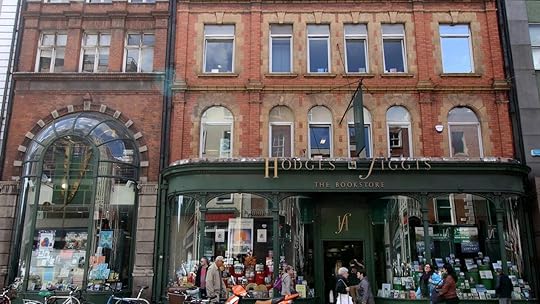
The bookstore has withstood changes in ownership and location over the centuries, yet its singular focus on selling books remains unchanged (other than a brief tryst with a ground floor coffee shop, which was removed in 2002 to make more room for…wait for it…books).
Now owned by the UK chain Waterstone’s, the store still feels like an indie, with knowledgeable staff taking the time for in-depth conversations with customers, and book launches and talks happening once or twice a week.
The multi-story building stocks 70,000 titles (with a million books on the premises at any given time) and is amongst the highest performers of Waterstone’s 280 locations.
Manna from heaven for bibliophiles. In a country where literacy rates are 99%, the education system performs far better than the EU average, and 75% of the population regularly reads books.
Ireland has a minimum living wage for writers, a very active arts council, a monthly book club for library books clubs and readers hosted every monthly by its Laureate for Irish Fiction, Colm Toibin, and a slew of additional initiatives which support and embody the country’s love of, and commitment to, the written word.
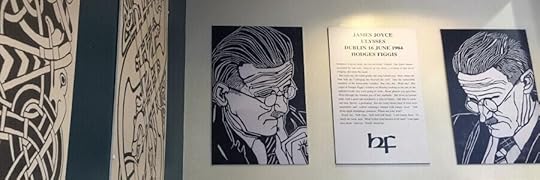
Hodges Figgis has made cameo appearances in novels ranging from James Joyce’s Ulysses to Sally Rooney’s Conversations with Friends:
What she? The virgin at Hodges Figgis’ window on Monday looking in for one of the alphabet books you were going to write. Keen glance you gave her. – James Joyce, Ulysses.
The next day there was a book launch in Hodges Figgis and Bobbi wanted to go and get a copy of the book signed.” – Sally Rooney, Conversations with Friends.
I was lucky enough to be in Dublin years ago for Bloomsday, and participate in the events at Hodges Figgis.
For those of you who don’t know, Bloomsday is a celebration that takes place in Ireland and around the world, commemorating 16 June 1904, the day at the heart of Ulysses, when protagonist Leopold Bloom (along with characters Stephen Dedalus and Molly Bloom) wander around Dublin in a modernist parallel to Homer’s Odyssey.
Bloomsday celebrations include readings and performances at the locations and establishments referenced in the novel. People often dress up in the clothes from the era, including the infamous straw boater hat.
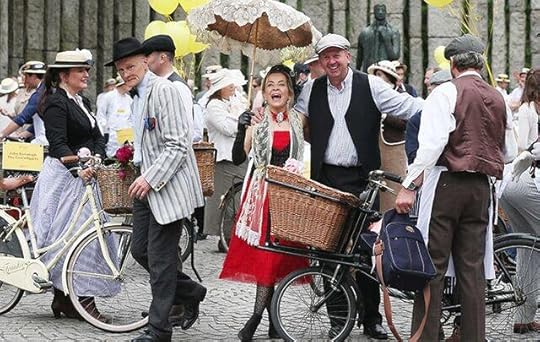
Consuming what Leopold Bloom ate, The Bloomsday Breakfast, is also popular (the full Irish fry, sometimes with liver and kidneys) although not one for me, given my squeamish appetite for animal flesh and in particular, offal.
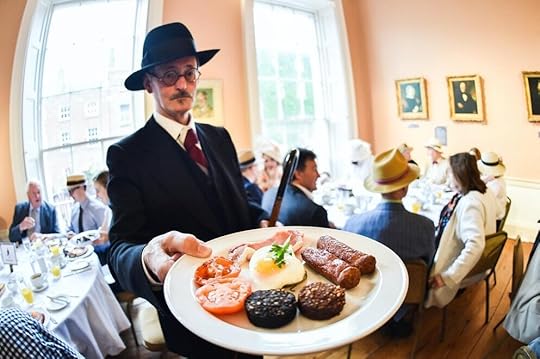
It’s altogether a fantastic day (now really a week – the Irish know how to party).
I hope you’ll join us at Hodges Figgis, 56-58 Dawson St, Dublin 2 on 12 July, 6-7:30pm for my book launch. Either because you live in Ireland OR because you’ve always wanted to go and now you’re Googling flights as you read this newsletter.
We may have missed the official Bloomsday this year, but we can still walk ‘streets broad and narrow’ and have ourselves a grand time. And for you hardy Canadians, I do love to follow Ulysses characters Stephen Dedalus and Buck Mulligen into the ‘scrotumtightening sea’ at the Forty Foot in Dublin Bay. It’s chilly, but so is Georgian Bay early in the season 🥶
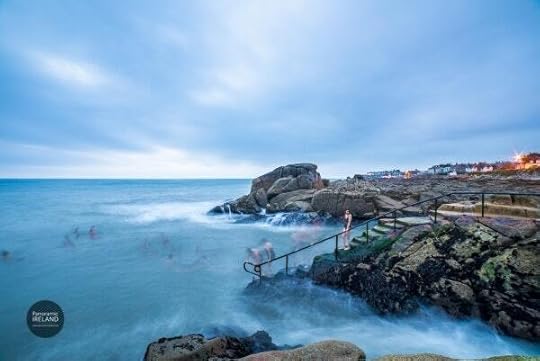
I’m thrilled to be leaving for Molyvos this weekend, then on to Dublin on 6 July. All my bags are packed, I’m ready to go. . . Come have some craic with me in Dublin (and in Cork)!
Pull FocusThe inaugural MotiveTO crime & mystery festival, launched by the Toronto International Festival of Authors, took place earlier this month. I had a blast hearing – for the first time – many writers I read. I also moderated a book event with two American thriller writers, Wanda Morris and Chris Pavone.
All Her Little Secrets is Wanda’s debut novel, which depicts a Black corporate lawyer who finds herself in the middle of an unsettling situation when she discovers her boss (who is also her secret lover) dead. This taut, sleek thriller recently won a Lefty Award for Best Debut Mystery Novel and is nominated for an Anthony. Wanda’s second novel, Anywhere Your Past Will Find You, drops this October.
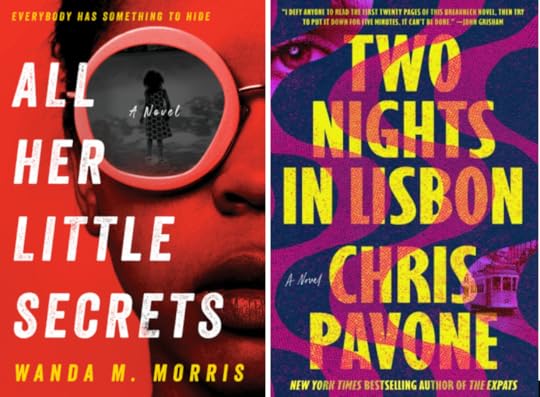
Two Nights in Lisbon, Chris’s fifth international thriller, published last month, immediately hitting the NYT bestseller list. Stephen King tweeted: “As close to unputdownable as you can get. Tight suspense, more twists and turns than a mountain road in Colorado.”
MotiveTO featured Canadian writers including Anna Porter, Nita Prose, Amy Stuart, Shari Lapena, Marissa Stapley, and many others. Amongst the international writers was one of my favourites, Adrian McKinty.
I’ve written previously about McKinty in Letterbox. His Inspector Duffy series, set in Belfast during the height of The Troubles, is as good as any novel I’ve read (of any genre) on the sectarian war.
McKinty told a disturbing story during his MotiveTO appearance. When asked why there had been no Sean Duffy book since 2017, he spoke about the legal struggles with his publisher.
For ten years, McKinty earned little money from his writing (a truism familiar to any writer on this list). An Oxford University alumnus, he supported his wife and kids by working at a bar and driving Uber, but when they received an eviction notice, he took it as a sign. Great critical reviews weren’t paying the rent.
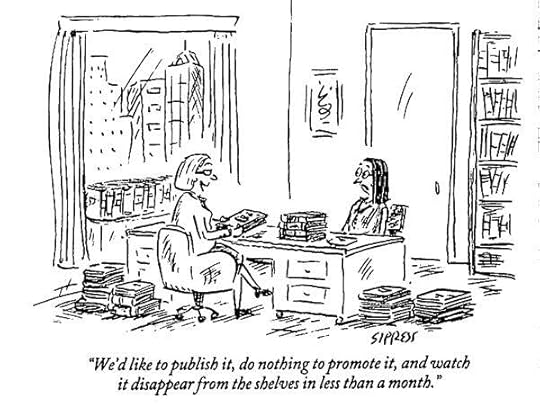
He posted a note to readers on his blog that he was giving up. Don Winslow, whose own success came after years of critically acclaimed but low-selling novels, stepped in to help, introducing McKinty to his agent. McKinty’s first commercially best-selling book, The Chain, appeared soon after and is now being turned into a feature film.
If life imitated art, cue the happy ending. But not so fast in the cutthroat world of publishing. Because McKinty, desperate to get published and without an agent, had earlier signed a contract he didn’t fully understand, one that gave the rights to his main character to his publisher.
Here McKinty was, with a readership large enough to finally guarantee a decent living from writing, but his publisher had the upside and the control. So, instead of releasing another Inspector Duffy book, McKinty sued to regain the rights to the character he’d created in the first place. Sadly, he lost and eventually had to buy back the rights. Another instalment in the series will now appear, and this time on his own terms.
A cautionary tale for writers everywhere.
New & GossipsLooking forward to not only reading singer Martha Wainwright’s recently published memoir, Stories I Might Regret Telling You, but also hearing her speak at the Edinburgh Book Festival this August.
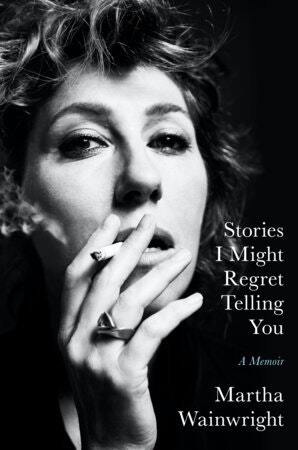
Her family is musical royalty – mother Kate McGarrigle of the McGarrigle sisters, father Loudon Wainwright III and brother Rufus. And Martha herself is one of my favourite singers. It was an eclectic childhood to say the least, and I’ll looking forward to digging into the book.
**
Amazon’s list of the best books of 2022 (so far) includes three Canadians. The enormously successful debut cozy mystery, The Maid, by Nita Prose. (Who is so nice it’s easy to root for her success.) Also, Sea of Tranquility by NYC-based Emily St. John Mandel and, I’m delighted to say, Such Big Dreams by Diaspora Dialogues alumni Reema Patel. This novel was workshopped through our mentoring programs.
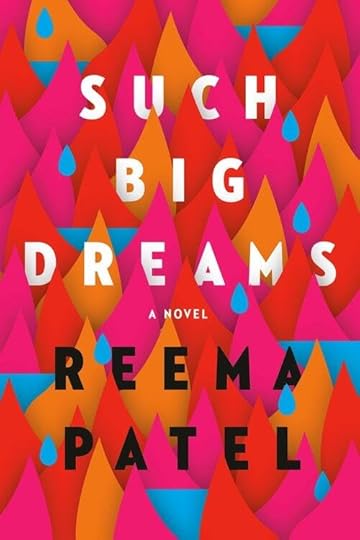
**
Excited for this week’s debut of another DD mentorship alumni, Sheila Murray, whose Finding Edward is being released by Cormorant Books.
**
Netflix’s economic woes – it’s lost 70% of its value and 220,000 subscribers – and increasing competition from Disney+, Peacock and HBO Max, have led to another round of layoffs, as well as cancellations of some projects in development.
I’ve started to go back into cinemas (albeit masked) for films such as Dune or Batman, where the experience is just not replicable on the small screen. My fellow audience goers seem modest so far in number, although US box office is on the rise, driven by big releases such as this past weekend’s Top Gun: Maverick, which had the highest grossing opening weekend EVER for a Tom Cruise movie.
It feels so good to be once again in the immersive experience of a darkened theatre, without the distraction of the iPhone on the couch beside me, or someone knocking at the door. Very much looking forward to the full Toronto International Film Festival experience being back this year (Sept 8-18, 2022). Ticket packages now on sale!
Bye for now. Thank you for joining me for this seventh issue of Letterbox . Please remember to:
Letterbox, Edition 17
The Dublin book launch of Pull Focus, post-poned last fall due to Ireland’s strict Covid lockdowns, has been re-scheduled for July 12th.
I’m entirely delighted.
As readers of this newsletter know, I hold dual Canadian and Irish citizenship, and have spent a lot of time in Ireland over the years, visiting friends and family (and my father’s grave, who’s buried in his hometown of Mallow alongside my grandparents).
I also partially wrote Pull Focus during two residencies at the Tyrone Guthrie at Annaghmakerrig, a magical artist’s centre in County Monaghan (located in Ulster, right near the border with Northern Ireland). So, it feels particularly poignant to be heading back for the first time post-Covid, and to have opportunity to present my book in a city and country which mean a great deal.
Hodges Figgis – the famed bookstore hosting my book launch – was founded in 1768 and is thought to be the third oldest bookshop in the world. It sits at the heart of any literary pilgrimage to Ireland.

The bookstore has withstood changes in ownership and location over the centuries, yet its singular focus on selling books remains unchanged (other than a brief tryst with a ground floor coffee shop, which was removed in 2002 to make more room for…wait for it…books).
Now owned by the UK chain Waterstone’s, the store still feels like an indie, with knowledgeable staff taking the time for in-depth conversations with customers, and book launches and talks happening once or twice a week.
The multi-story building stocks 70,000 titles (with a million books on the premises at any given time) and is amongst the highest performers of Waterstone’s 280 locations.
Manna from heaven for bibliophiles. In a country where literacy rates are 99%, the education system performs far better than the EU average, and 75% of the population regularly reads books.
Ireland has a minimum living wage for writers, a very active arts council, a monthly book club for library books clubs and readers hosted every monthly by its Laureate for Irish Fiction, Colm Toibin, and a slew of additional initiatives which support and embody the country’s love of, and commitment to, the written word.

Hodges Figgis has made cameo appearances in novels ranging from James Joyce’s Ulysses to Sally Rooney’s Conversations with Friends:
What she? The virgin at Hodges Figgis’ window on Monday looking in for one of the alphabet books you were going to write. Keen glance you gave her. – James Joyce, Ulysses.
The next day there was a book launch in Hodges Figgis and Bobbi wanted to go and get a copy of the book signed.” – Sally Rooney, Conversations with Friends.
I was lucky enough to be in Dublin years ago for Bloomsday, and participate in the events at Hodges Figgis.
For those of you who don’t know, Bloomsday is a celebration that takes place in Ireland and around the world, commemorating 16 June 1904, the day at the heart of Ulysses, when protagonist Leopold Bloom (along with characters Stephen Dedalus and Molly Bloom) wander around Dublin in a modernist parallel to Homer’s Odyssey.
Bloomsday celebrations include readings and performances at the locations and establishments referenced in the novel. People often dress up in the clothes from the era, including the infamous straw boater hat.

Consuming what Leopold Bloom ate, The Bloomsday Breakfast, is also popular (the full Irish fry, sometimes with liver and kidneys) although not one for me, given my squeamish appetite for animal flesh and in particular, offal.

It’s altogether a fantastic day (now really a week – the Irish know how to party).
I hope you’ll join us at Hodges Figgis, 56-58 Dawson St, Dublin 2 on 12 July, 6-7:30pm for my book launch. Either because you live in Ireland OR because you’ve always wanted to go and now you’re Googling flights as you read this newsletter.
We may have missed the official Bloomsday this year, but we can still walk ‘streets broad and narrow’ and have ourselves a grand time. And for you hardy Canadians, I do love to follow Ulysses characters Stephen Dedalus and Buck Mulligen into the ‘scrotumtightening sea’ at the Forty Foot in Dublin Bay. It’s chilly, but so is Georgian Bay early in the season 🥶

I’m thrilled to be leaving for Molyvos this weekend, then on to Dublin on 6 July. All my bags are packed, I’m ready to go. . . Come have some craic with me in Dublin (and in Cork)!
Pull FocusThe inaugural MotiveTO crime & mystery festival, launched by the Toronto International Festival of Authors, took place earlier this month. I had a blast hearing – for the first time – many writers I read. I also moderated a book event with two American thriller writers, Wanda Morris and Chris Pavone.
All Her Little Secrets is Wanda’s debut novel, which depicts a Black corporate lawyer who finds herself in the middle of an unsettling situation when she discovers her boss (who is also her secret lover) dead. This taut, sleek thriller recently won a Lefty Award for Best Debut Mystery Novel and is nominated for an Anthony. Wanda’s second novel, Anywhere Your Past Will Find You, drops this October.

Two Nights in Lisbon, Chris’s fifth international thriller, published last month, immediately hitting the NYT bestseller list. Stephen King tweeted: “As close to unputdownable as you can get. Tight suspense, more twists and turns than a mountain road in Colorado.”
MotiveTO featured Canadian writers including Anna Porter, Nita Prose, Amy Stuart, Shari Lapena, Marissa Stapley, and many others. Amongst the international writers was one of my favourites, Adrian McKinty.
I’ve written previously about McKinty in Letterbox. His Inspector Duffy series, set in Belfast during the height of The Troubles, is as good as any novel I’ve read (of any genre) on the sectarian war.
McKinty told a disturbing story during his MotiveTO appearance. When asked why there had been no Sean Duffy book since 2017, he spoke about the legal struggles with his publisher.
For ten years, McKinty earned little money from his writing (a truism familiar to any writer on this list). An Oxford University alumnus, he supported his wife and kids by working at a bar and driving Uber, but when they received an eviction notice, he took it as a sign. Great critical reviews weren’t paying the rent.

He posted a note to readers on his blog that he was giving up. Don Winslow, whose own success came after years of critically acclaimed but low-selling novels, stepped in to help, introducing McKinty to his agent. McKinty’s first commercially best-selling book, The Chain, appeared soon after and is now being turned into a feature film.
If life imitated art, cue the happy ending. But not so fast in the cutthroat world of publishing. Because McKinty, desperate to get published and without an agent, had earlier signed a contract he didn’t fully understand, one that gave the rights to his main character to his publisher.
Here McKinty was, with a readership large enough to finally guarantee a decent living from writing, but his publisher had the upside and the control. So, instead of releasing another Inspector Duffy book, McKinty sued to regain the rights to the character he’d created in the first place. Sadly, he lost and eventually had to buy back the rights. Another instalment in the series will now appear, and this time on his own terms.
A cautionary tale for writers everywhere.
New & GossipsLooking forward to not only reading singer Martha Wainwright’s recently published memoir, Stories I Might Regret Telling You, but also hearing her speak at the Edinburgh Book Festival this August.

Her family is musical royalty – mother Kate McGarrigle of the McGarrigle sisters, father Loudon Wainwright III and brother Rufus. And Martha herself is one of my favourite singers. It was an eclectic childhood to say the least, and I’ll looking forward to digging into the book.
**
Amazon’s list of the best books of 2022 (so far) includes three Canadians. The enormously successful debut cozy mystery, The Maid, by Nita Prose. (Who is so nice it’s easy to root for her success.) Also, Sea of Tranquility by NYC-based Emily St. John Mandel and, I’m delighted to say, Such Big Dreams by Diaspora Dialogues alumni Reema Patel. This novel was workshopped through our mentoring programs.

**
Excited for this week’s debut of another DD mentorship alumni, Sheila Murray, whose Finding Edward is being released by Cormorant Books.
**
Netflix’s economic woes – it’s lost 70% of its value and 220,000 subscribers – and increasing competition from Disney+, Peacock and HBO Max, have led to another round of layoffs, as well as cancellations of some projects in development.
I’ve started to go back into cinemas (albeit masked) for films such as Dune or Batman, where the experience is just not replicable on the small screen. My fellow audience goers seem modest so far in number, although US box office is on the rise, driven by big releases such as this past weekend’s Top Gun: Maverick, which had the highest grossing opening weekend EVER for a Tom Cruise movie.
It feels so good to be once again in the immersive experience of a darkened theatre, without the distraction of the iPhone on the couch beside me, or someone knocking at the door. Very much looking forward to the full Toronto International Film Festival experience being back this year (Sept 8-18, 2022). Ticket packages now on sale!
Bye for now. Thank you for joining me for this seventh issue of Letterbox . Please remember to:
April 13, 2022
Letterbox: Bookish & Filmish
Below, in today’s Letterbox:
Join me for a free, online author event, Thursday, April 14, 6-7pm ET).
Enter this BookSweeps Giveaway to win a free copy of Pull Focus + 35 other books and a new iReader (ends today April 13!)
News & Gossips, including spring book recommendations.
Well, that was fun.
Meet ‘The Jane’ – a gin, cucumber juice, fennel-infused SoCal kind of cocktail, created by Jonathan the mixologist at Piccolo Santa Monica where I held my long Covid re-scheduled LA book launch. A drink as feisty and original as her protagonist namesake.
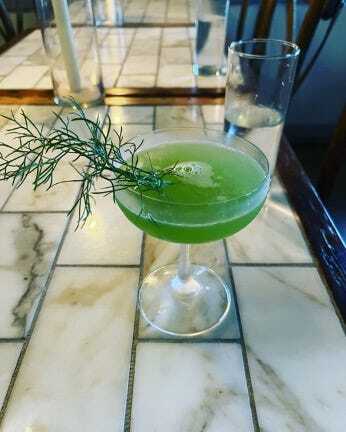
It was wonderful to be back in LA, a city where I previously worked. Years ago, during a two-year run on a crazy entertainment project, I’d fly west from NYC every second week and stay in a lovely bungalow on the grounds at the Fairmont Miramar Santa Monica, a fabled property that recently celebrated its 100th birthday.
The property, a block away from the ocean, was originally the residence of silver mining magnate and senator John P Jones, who co-established the town of Santa Monica in 1875. He entertained such as guests as Susan B Anthony and Mark Twain in his “White House of the West,” as it came to be known.
Shortly before he died, Jones sold the property to King Gillette (you guessed it, best known for the Gillette Razor), and then to hotelier Gilbert Stevenson. In between, it served a brief stint in World War I as a boys’ military academy.
The Miramar (‘sea-view’) opened as a hotel in 1921. Over the years, the property has played home to many famous long-term guests, including Greta Garbo, Senator John F Kennedy and Jackie Kennedy.

(The Miramar’s famous fig tree, declared a historic landmark.)
The iconic property has withstood multiple owners, construction additions and deletions, celebrity overdoses and luxurious weddings, as well World War II, when used as a redistribution centre for army officers returning from overseas.
It’s also starred in numerous TV shows and films, including That Touch of Mink, (Cary Grant and Doris Day), Dallas, Hart to Hart, Starsky and Hutch and Knot’s Landing.
The history of the Miramar is interwoven with the history of Santa Monica, and indeed in many ways the City of Angels itself, which incorporated as a municipality in 1850 (just before California became a state).
Los Angeles punches above its weight as cultural zeitgeist – this city of rags-to-riches and sudden reversals, glamour and seediness, eccentricity and charm. It’s Muscle Beach and the Venice Boardwalk, Beverly Hills and Bel-Air, Compton and South Central, Selling Sunset and the Santa Monica Pier.

We breath in references to LA with everything we read, watch and listen because they are so ubiquitous. Like a movie set, the place seems somehow constructed – half real, half-magic, and entirely compelling. One is supposed to hate on La-la Land, especially if you’ve lived in New York, but the truth is, I love it.
The mountains and the ocean are unbeatable, as is the contemporary food, music and art scenes, great independent bookstores, and a hugely diverse populace of Angelenos who come from all over the world and hustle to make it their home.
I’m grateful for the support and friendship of the Consulate General of Canada in Los Angeles, and new friends Mana and Ann, who sherpaed me all around LA. Mana was instrumental in organizing the book event. Ann took me walking along the Malibu beaches and to the Getty Museum, a modernist wonder perched in the hills over West LA. As a Canadian, I felt right at home when I got to this exhibition:

I was also delighted to catch up with Aviva Layton in her very funky West Hollywood cottage not far from the Petite Hermitage hotel, where I stayed a few years ago – a remarkable boutique hotel with a rooftop pool, extraordinary art collection and an unusual minibar selection (of the sex toy variety).
I’m grateful to Diesel Books for being the launch’s bookstore partner. Co-owners Alison Reid and John Evans (also life partners who after forty years together recently decided to tie the knot) have beautiful, well-curated stores in Del Mar and Brentwood.
It’s been a hard haul for indie booksellers the past two years; I stand in admiration of the determination and skill needed to keep these vital community spaces going.
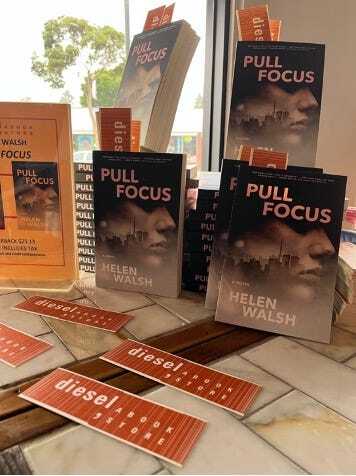 Pull Focus
Pull FocusReally looking forward to being in conversation with Halifax-based journalist, and AfterWords festival director, Stephanie Domet, tomorrow Thursday, April 14 @ 6pm ADT/7pm EDT. Please join us for this online conversation. Free registration HERE. Bookstore partner: another great indie, BookMark Halifax.
**
Enter this BookSweeps giveaway to win Pull Focus plus 35 Mystery, Thriller & Suspense novels and a new e-Reader. It ends today (April 13th) though, so you’ll have to act quick. More info here: https://www.booksweeps.com/giveaway/april-2022/bb-mystery-thriller-suspense/

Are you aware of BookBub? It’s a free service that offers deep discounts on eBooks, with a subscriber base of 10 million people. You sign up, pick your favourite genres, and each day receive a curated list of specials ($1.99-$4.99), available through whatever platform you normally use, ie, Apple books, Kindle, Barnes & Noble’s Nook Store, etc.
Between BookBub and Kobo, I’ve downloaded a LOT of eBooks during Covid. While I’m primarily a print book reader, I appreciate having choice for travel or while in bed reading. (Easier to hold up!) I may never read all I continue to download, but unlike library books, they don’t disappear when your loan is up, or when Wifi is unavailable.
News & GossipsSo delighted at the many books alumni of Diaspora Dialogues’s mentoring programs are publishing this spring, including Terri Favro’s The Sisters Sputnik, Aaron Kreuter’s Shifting Baseline Symptom, Sheila Murray’s Finding Edward, Dawn Promislow’s Wan, Reema Patel’s Such Big Dreams, Salma Hussain’s The Secret Diary of Mona Hasan, The Day-Breakers by Michael Fraser, Waking Occupations by Phoebe Wang and Stacey Mae Fowle’s co-edited collection Good Mom on Paper.
Also thrilled for Mai Nguyen, another DD alum, who sold her debut novel, Sunshine Nails, in a six-figure deal to Atria Books in the US/Simon & Schuster Canada for publication in summer 2023. The novel follows a Vietnamese family living in a gentrifying Toronto neighborhood who see their “no-frills nail salon threatened by the arrival of a new ‘Starbucks of nails’ salon.”
And lastly, congrats to DD alum Catherine Hernandez, whose film Scarborough I profiled in last month’s Letterbox. Scarborough cleaned up this past weekend, winning eight Canadian Screen Awards, included best adapted screenplay for Catherine, as well as best picture, best directing and the John Dunning best first feature film award.
**
April is National Poetry Month, and I was delighted to return home from LA to find my pre-order of Farzana Doctor’s new collection, You Still Look the Same.
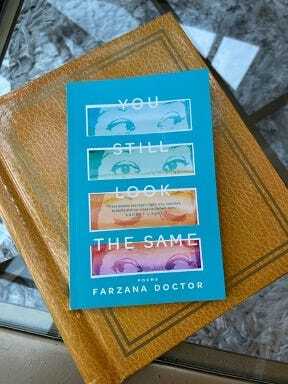
Other poetry books currently on order, or about to be, are Cane|Fire by Shani Mootoo, Vinegar Hill by Colm Toibin, Land of the Rock: Talamh an Carraig by Heather Nolan, and Time Is a Mother by Ocean Vuong. Just a start.
**
There’s a lot of inside publishing baseball writing happening these days. Tessa Sharp, a US hybrid fiction author (including The Girls I’ve Been currently being adapted for Netflix), is very active on Twitter. (Hybrid = an author who combined both traditional and self-publishing, the later now being called indie publishing.)
Sharp bluntly details the minutiae of the industry from the POV of someone who supports themselves by their writing alone. Publishing is a business, and authors need to be entrepreneurs, a reality we don’t talk enough about.
I’ve also subscribed to the brand new Substack newsletter by Paul Bogaards, Kill Darlings. Bogaards was Deputy Publisher/EVP of Publicity at Knopf US for decades years before calling it quits. The newsletter is a cri de coeur for the state of publishing (primarily large houses) by someone who is both fatalistic about the industry’s challenges, yet hopeful that change is possible. It’s also very funny.
**
Bye for now. Thank you for joining me for this sixteenth issue of Letterbox . Please remember to:
Letterbox, Edition 16
Below, in today’s Letterbox:
Join me for a free, online author event, Thursday, April 14, 6-7pm ET).
Enter this BookSweeps Giveaway to win a free copy of Pull Focus + 35 other books and a new iReader (ends today April 13!)
News & Gossips, including spring book recommendations.
Well, that was fun.
Meet ‘The Jane’ – a gin, cucumber juice, fennel-infused SoCal kind of cocktail, created by Jonathan the mixologist at Piccolo Santa Monica where I held my long Covid re-scheduled LA book launch. A drink as feisty and original as her protagonist namesake.
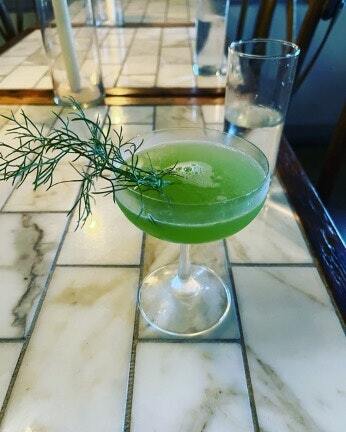
It was wonderful to be back in LA, a city where I previously worked. Years ago, during a two-year run on a crazy entertainment project, I’d fly west from NYC every second week and stay in a lovely bungalow on the grounds at the Fairmont Miramar Santa Monica, a fabled property that recently celebrated its 100th birthday.
The property, a block away from the ocean, was originally the residence of silver mining magnate and senator John P Jones, who co-established the town of Santa Monica in 1875. He entertained such as guests as Susan B Anthony and Mark Twain in his “White House of the West,” as it came to be known.
Shortly before he died, Jones sold the property to King Gillette (you guessed it, best known for the Gillette Razor), and then to hotelier Gilbert Stevenson. In between, it served a brief stint in World War I as a boys’ military academy.
The Miramar (‘sea-view’) opened as a hotel in 1921. Over the years, the property has played home to many famous long-term guests, including Greta Garbo, Senator John F Kennedy and Jackie Kennedy.

(The Miramar’s famous fig tree, declared a historic landmark.)
The iconic property has withstood multiple owners, construction additions and deletions, celebrity overdoses and luxurious weddings, as well World War II, when used as a redistribution centre for army officers returning from overseas.
It’s also starred in numerous TV shows and films, including That Touch of Mink, (Cary Grant and Doris Day), Dallas, Hart to Hart, Starsky and Hutch and Knot’s Landing.
The history of the Miramar is interwoven with the history of Santa Monica, and indeed in many ways the City of Angels itself, which incorporated as a municipality in 1850 (just before California became a state).
Los Angeles punches above its weight as cultural zeitgeist – this city of rags-to-riches and sudden reversals, glamour and seediness, eccentricity and charm. It’s Muscle Beach and the Venice Boardwalk, Beverly Hills and Bel-Air, Compton and South Central, Selling Sunset and the Santa Monica Pier.

We breath in references to LA with everything we read, watch and listen because they are so ubiquitous. Like a movie set, the place seems somehow constructed – half real, half-magic, and entirely compelling. One is supposed to hate on La-la Land, especially if you’ve lived in New York, but the truth is, I love it.
The mountains and the ocean are unbeatable, as is the contemporary food, music and art scenes, great independent bookstores, and a hugely diverse populace of Angelenos who come from all over the world and hustle to make it their home.
I’m grateful for the support and friendship of the Consulate General of Canada in Los Angeles, and new friends Mana and Ann, who sherpaed me all around LA. Mana was instrumental in organizing the book event. Ann took me walking along the Malibu beaches and to the Getty Museum, a modernist wonder perched in the hills over West LA. As a Canadian, I felt right at home when I got to this exhibition:

I was also delighted to catch up with Aviva Layton in her very funky West Hollywood cottage not far from the Petite Hermitage hotel, where I stayed a few years ago – a remarkable boutique hotel with a rooftop pool, extraordinary art collection and an unusual minibar selection (of the sex toy variety).
I’m grateful to Diesel Books for being the launch’s bookstore partner. Co-owners Alison Reid and John Evans (also life partners who after forty years together recently decided to tie the knot) have beautiful, well-curated stores in Del Mar and Brentwood.
It’s been a hard haul for indie booksellers the past two years; I stand in admiration of the determination and skill needed to keep these vital community spaces going.
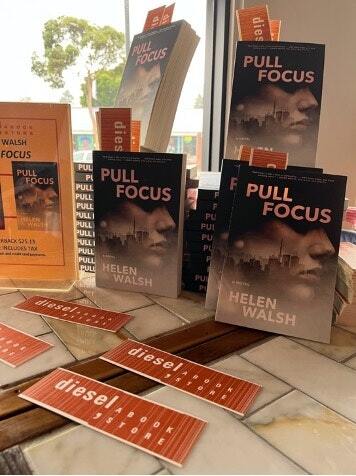 Pull Focus
Pull FocusReally looking forward to being in conversation with Halifax-based journalist, and AfterWords festival director, Stephanie Domet, tomorrow Thursday, April 14 @ 6pm ADT/7pm EDT. Please join us for this online conversation. Free registration HERE. Bookstore partner: another great indie, BookMark Halifax.
**
Enter this BookSweeps giveaway to win Pull Focus plus 35 Mystery, Thriller & Suspense novels and a new e-Reader. It ends today (April 13th) though, so you’ll have to act quick. More info here: https://www.booksweeps.com/giveaway/april-2022/bb-mystery-thriller-suspense/

Are you aware of BookBub? It’s a free service that offers deep discounts on eBooks, with a subscriber base of 10 million people. You sign up, pick your favourite genres, and each day receive a curated list of specials ($1.99-$4.99), available through whatever platform you normally use, ie, Apple books, Kindle, Barnes & Noble’s Nook Store, etc.
Between BookBub and Kobo, I’ve downloaded a LOT of eBooks during Covid. While I’m primarily a print book reader, I appreciate having choice for travel or while in bed reading. (Easier to hold up!) I may never read all I continue to download, but unlike library books, they don’t disappear when your loan is up, or when Wifi is unavailable.
News & GossipsSo delighted at the many books alumni of Diaspora Dialogues’s mentoring programs are publishing this spring, including Terri Favro’s The Sisters Sputnik, Aaron Kreuter’s Shifting Baseline Symptom, Sheila Murray’s Finding Edward, Dawn Promislow’s Wan, Reema Patel’s Such Big Dreams, Salma Hussain’s The Secret Diary of Mona Hasan, The Day-Breakers by Michael Fraser, Waking Occupations by Phoebe Wang and Stacey Mae Fowle’s co-edited collection Good Mom on Paper.
Also thrilled for Mai Nguyen, another DD alum, who sold her debut novel, Sunshine Nails, in a six-figure deal to Atria Books in the US/Simon & Schuster Canada for publication in summer 2023. The novel follows a Vietnamese family living in a gentrifying Toronto neighborhood who see their “no-frills nail salon threatened by the arrival of a new ‘Starbucks of nails’ salon.”
And lastly, congrats to DD alum Catherine Hernandez, whose film Scarborough I profiled in last month’s Letterbox. Scarborough cleaned up this past weekend, winning eight Canadian Screen Awards, included best adapted screenplay for Catherine, as well as best picture, best directing and the John Dunning best first feature film award.
**
April is National Poetry Month, and I was delighted to return home from LA to find my pre-order of Farzana Doctor’s new collection, You Still Look the Same.
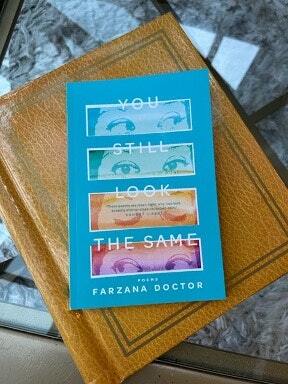
Other poetry books currently on order, or about to be, are Cane|Fire by Shani Mootoo, Vinegar Hill by Colm Toibin, Land of the Rock: Talamh an Carraig by Heather Nolan, and Time Is a Mother by Ocean Vuong. Just a start.
**
There’s a lot of inside publishing baseball writing happening these days. Tessa Sharp, a US hybrid fiction author (including The Girls I’ve Been currently being adapted for Netflix), is very active on Twitter. (Hybrid = an author who combined both traditional and self-publishing, the later now being called indie publishing.)
Sharp bluntly details the minutiae of the industry from the POV of someone who supports themselves by their writing alone. Publishing is a business, and authors need to be entrepreneurs, a reality we don’t talk enough about.
I’ve also subscribed to the brand new Substack newsletter by Paul Bogaards, Kill Darlings. Bogaards was Deputy Publisher/EVP of Publicity at Knopf US for decades years before calling it quits. The newsletter is a cri de coeur for the state of publishing (primarily large houses) by someone who is both fatalistic about the industry’s challenges, yet hopeful that change is possible. It’s also very funny.
**
Bye for now. Thank you for joining me for this sixteenth issue of Letterbox . Please remember to:



